
DARDANUP: parish now more than a century-and-a-half old Pages 2-3


The Parish. The Nation. The World.
Feast of the Assumption
The Feast of the Assumption on 15 August is a holy day of obligation. Catholics are to attend Mass either on the feast or its vigil.
Thursday August ,
Perth, Western Australia ● $1 Western Australia’s Award-winning Catholic newspaper
GREEK VISIT: Orthodox seminarians’ visit is a privilege for Perth Page 5
WANTED: men and women of faith for evangelisation Page 10
Eucharistic miracle
Priest recalls Dardanup chaplain’s war experience
A publication for Australian soldiers who fought in New Guinea in World War II has revived memories of a war-time eucharistic miracle associated with a former Parish Priest, Mgr Charles Cunningham, who was a famous WW2 padre with various Army units, but particularly the 2/16 Battalion, AIF.
The chalice associated with the miracle was presented to the 2/16 Battalion (AIF) Association last year by Fr Noel Fitzsimons and Fr Bernie Dwyer, in accordance with Fr Cunningham’s wishes.
As well as presenting the chalice, Fr Fitzsimons, who is PP at Waroona-Yarloop, handed over his written account of the miracle as told to him by Fr Cunningham. The story was published in the Association’s journal “Pigeon Post” in June 2004. It reads:
“Before the assault on Gona Beach, November 1942, Padre Cunningham told the battalion he was going to offer Mass for them all. The assault against the entrenched Japanese soldiers would be a bloody battle and he knew that many of those men he addressed would be killed or wounded.
“Padre Cunningham selected a site for the Mass nearby where the battalion were stationed and about 120-150 soldiers followed him to the Mass site. He preceded the Mass with a general absolution, and began the Mass setting aside the approximate number of hosts for the men who had followed him.
“At Communion time, because in those days Communion was received under the form of bread alone, he purified the chalice and
Continued on Page 12
Evangelii Nuntiandi Conference


30 YEARS
September 22
Willetton
BOOKS FOR THE YOUNG
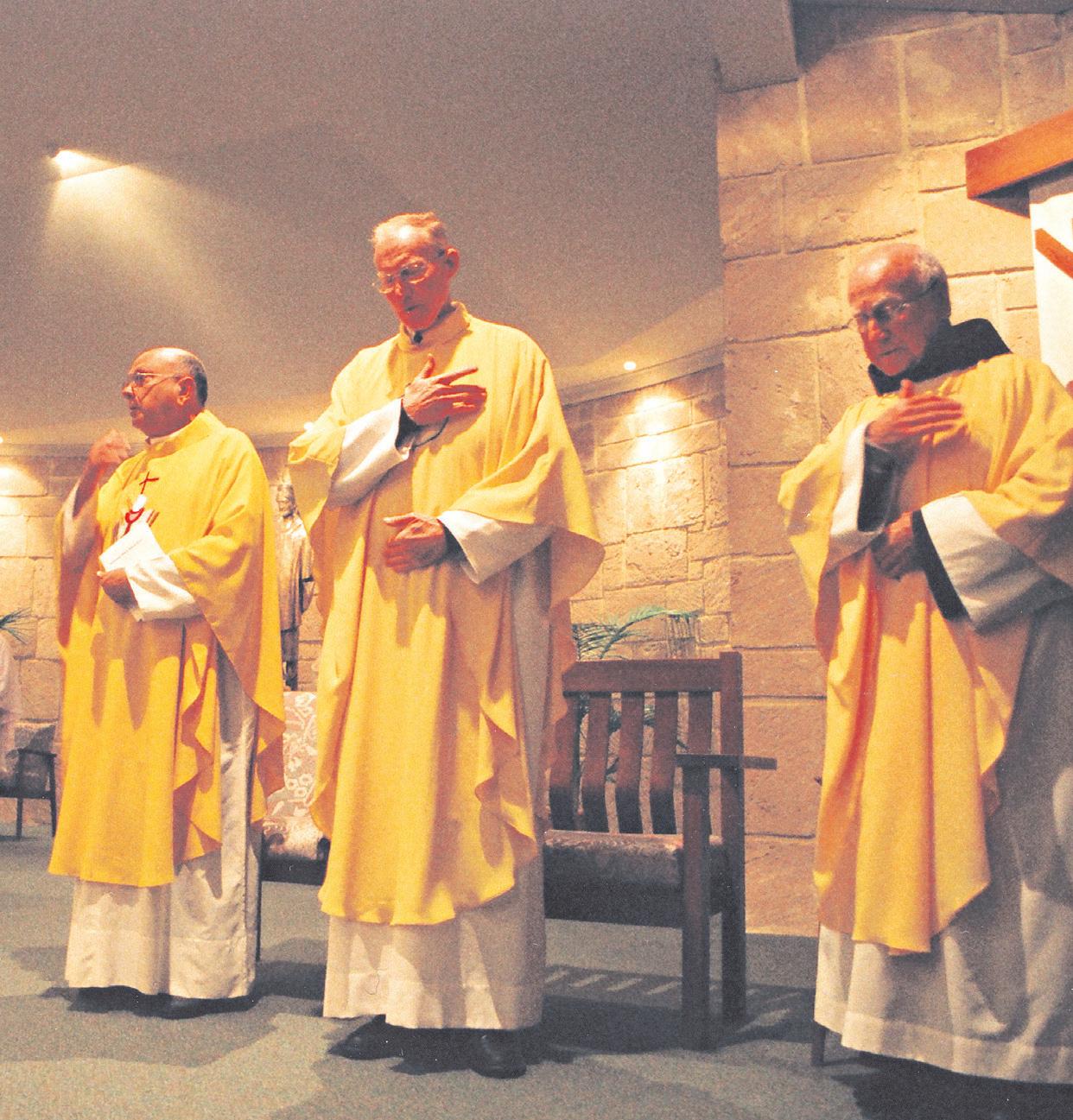
UK man loses case to receive food and water
■ By Simon
Caldwell
A terminally-ill Englishman has lost a legal battle to uphold his right not to be starved and dehydrated to death after he loses the ability to communicate.
Leslie Burke, 45, a Catholic from Lancaster, England, suffers from cerebellar ataxia, a degenerative disorder of the nervous system that causes unsteadiness and lack of coordination. Burke, a former postal worker, knows eventually he will not be able to communicate; he fears doctors may withhold artificial nutrition and hydration when that time comes.
He also is worried that he consciously may suffer a prolonged and agonizing death.
A three-judge panel on the Court of Appeal ruled on July 28 that patients did not have the right to request treatment.
“Where a patient indicates his or her wish to be kept alive by provision of artificial nutrition and hydration, any doctor who deliberately brings that patient’s life to an end by discontinuing the supply of artificial nutrition and hydration will not merely be in breach of duty but guilty of murder,” said Lord Phillips, the head of the panel.
“Ultimately, however, a patient cannot demand that a doctor administer a treatment which the doctor considers is adverse to the patient’s clinical needs,” he said.
How can the church better proclaim the Gospel to the people of the 21st century?
Suggestions will be offered at a one-day conference to be held in Perth on September 22 and all are being invited.
The conference, to be held in the Sts John and Paul Parish centre in Willetton, will celebrate the 30th anniversary of Pope Paul VI’s apostolic exhortation on evangelisation, Evengelii Nuntiandi, one of the landmark documents of the
Finding faith-inspired reading for young people can be difficult. The Record offers readers the chance to obtain some beautiful books for the young - and not so young!
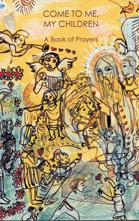
modern Church. The closing Mass will be celebrated by Archbishop Hickey with bishops and clergy from around WA.
Internationally-acclaimed writer, scholar and missionary Father Stephen Bevans, SVD will be among the speakers offering perspectives on the way forward.
Fr Bevans is based at Chicago Theological Union and will encourage questions about what mission means in the Australian context today. The one-day conference will
also include local responses to the presentation, small-group discussion, and space for sharing participants’ missionary experiences. It will run from 9.30am-4.30pm and the cost is $25 waged or $10 unwaged. Lunch and refreshments will be provided
For more information contact Francis Leong on 9422 7933 or cath olicmissionperth@bigpond.com.
Fr John Thornhill reviews Stephen Bevans’ book on evangelisation - Page 10
WHO CHOOSES?
Burke told CNS he welcomed the “extremely strong language” of Lord Phillips in defense of his right to life during the time he is able to communicate. But he said the ruling still leaves him feeling entirely vulnerable.
“When I am no longer able to communicate, power is going to swing back wholly to the hands of the treating doctors,” Burke said.
“Even if I made an advance directive, it makes no difference. It’s not binding on the doctor to take any notice.
End of life decisions are increasingly appearing in the news. Bioethicist Fr Joseph Parkinson commences the first in a series looking at the complexities. Vista
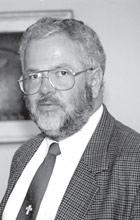
soon to be on the Web
Page 12
INDEX Letters - Page 6 Busselton students in Timor - Vista 4 The World - Pages 8-9 Reviews - Page 10 Classifieds - Page 11
1
Faithful: Fathers Anton Hesse, left, Dan Foley and Michael Brown OFM bless themselves at the commencement of Mass in Lockridge on Monday evening to collectively celebrate each reaching 50 years of priesthood. Reports: Vista 2-4
The Parish of Dardanup in WA’s south-west is now in its 151st year of existence. The Record’s JAMIE O’BRIEN recently spent some time with the faithful of Dardanup looking at the past and the present of a parish that has held on through thick and thin over the last century and a half…
Dardanup keeps faith
150years after the Benedictine order first established it in 1854, the Parish of the Immaculate Conception, Dardanup, is back in the care of the Benedictine Community.
The parish celebrated 150 years since the founding of the Thomas Little Memorial Hall – the original Church of the Immaculate Conception – in early December last year.
Dardanup was the first country Catholic Church opening a few months before the Albany Church.
The parish was returned to the care of the Benedictine Community with the appointment of Benedictine monk Fr John Herbert OSB in April this year.
On that occasion, Bishop Gerard Holohan of Bunbury said the appointment re-established the association between the Benedictine community and the Dardanup parish dating back to 1854.
Bishop Salvado laid the original foundation stone on March 25 1854 in the absence of Bishop Serra, the Apostolic Administrator of the Perth Diocese at the time.
The 50 acre property had been donated to Bishop Serra by Thomas Little to build a church, for which he also supplied 100,000 bricks and 500 bushels of lime.
Besides being used for Church services it was also used as a Catholic school, conducted by Mr Little and various priests who educated the children of the district.
George Fee, author of Fee’s Dardanup Diaries, recorded that many activities took place in the old Church, primarily for the education of children by the Sisters of Mercy.
It was also used for social gatherings, card evenings and fund-raising activities.
The site still retains its air of rural beauty.
In January 1856, Fr Peter Aragon, from the New Norcia Benedictine community arrived as the first parish priest of Dardanup.
Fr Aragon lived in the parish and became an honoured guest.
Unfortunately his stay was short as he was recalled after less than a year.
Another Spanish priest, Fr Peter Garrido OSB was appointed in 1857. His ministry extended from Australind to Busselton.
Two more Spanish priests were appointed at his departure the following year, until Belgian Fr Lecaille arrived.
All of them lived at Dardanup Park with Thomas Little, until he died in 1877.
In 1938 the new Church of the Immaculate Conception was built, because of an increase in the number of parishioners of the town.
After Cyclone Alby in April 1978, the old Church was in need of a new roof.With the help of the parish priest Fr McGrath, teachers, parishioners and a financial grant from the Government, the building was fully restored and renamed on September 30 the following year.
Further restorations were carried out again in 1993.
Local historian Gwen Wells said a main event of the 150th celebrations in December was the liturgy during which a procession of four generations of the Rodgers family carried the scriptures into the Church.
The ceremony represented the
BRONWENCLUNE clune@therecord.com.au
MARKREIDY reidyrec@iinet.net.au OFFICE
PRODUCTION
Fax:(08)92277087 TheRecordisaweeklypublicationdistributedthroughparishesofthe
years
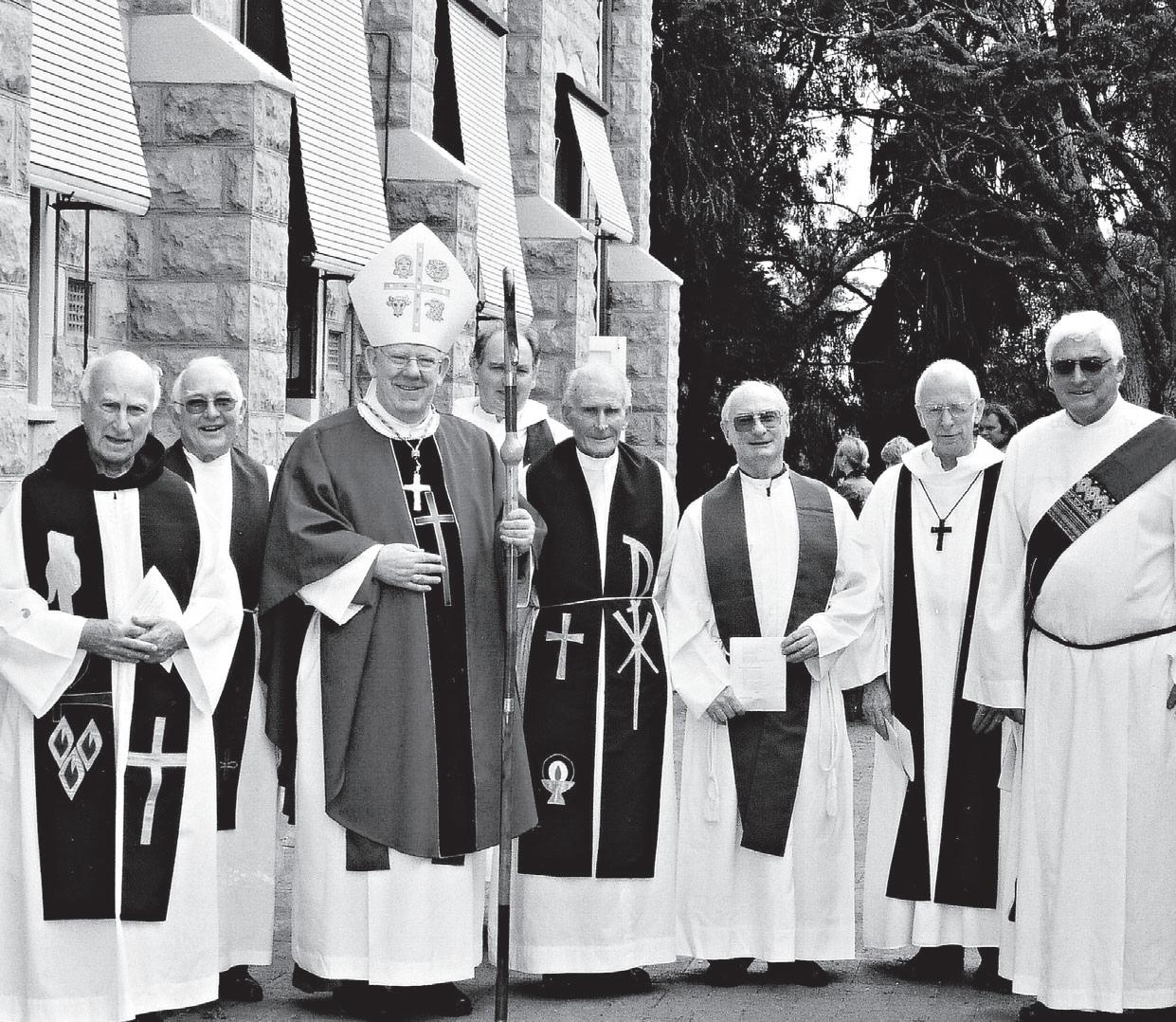
passing on of faith over the years.
Mrs Wells, who has been collecting memorabilia concerning the parish over many years, presented her archival collection to Dean Bryan Sykes, the Parish administrator on behalf of the Parish.
Cynthia Armstrong, a former principal of the school during the period that major restoration
works were carried out in the late 1970’s, returned to Dardanup from Queensland for the event.
Mrs Armstrong gave an emotional recollection of her time in Dardanup and the people she encountered during her life there.
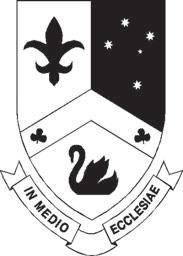



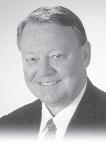
Page 2 August 11 2005, The Record The Record
Parish. The Nation. The World.
PETERROSENGREN Lettersto:cathrec@iinet.net.au
JAMIEO'BRIEN
The
EDITOR
JOURNALISTS
jamieob@therecord.com.au
MANAGER EUGENESUARES
ADVERTISING CHRISMIZEN
administration@therecord.com.au inc.sales/subscriptions
advertising@therecord.com.au
MANAGER DEREKBOYLEN production@therecord.com.au 587NewcastleSt,Leederville Post:POBox75,Leederville,WA6902 Tel:(08)92277080
diocesesofWesternAustraliaandbysubscription. Why not stay at STORMANSTON HOUSE 27 McLaren Street, North Sydney Restful & secure accommodation operated by the Sisters of Mercy, North Sydney. • Situated in the heart of North Sydney and short distance to the city • Rooms available with ensuite facility • Continental breakfast, tea/coffee making facilities & television • Separate lounge/dining room, kitchen & laundry • Private off-street parking Contact: Phone: 0418 650 661 or email: nsstorm@tpg.com.au VISITING SYDNEY A LIFE OF PRAYER ... are you called to the Benedictine life of divine praise and eucharistic prayer for the Church? Contact the: Rev Mother Cyril, OSB, Tyburn Priory, 325 Garfield Road, Riverstone, NSW 2765 www.tyburnconvent.org.uk TYBURN NUNS Year of the Eucharist Holy Hour Exposition, Vespers & Benediction Sunday evenings 6.30pm – 7.30pm St Joseph’s Priory Church Treasure Road Queens Park Holy Hour Norbertine Canons ® A division of Interworld Travel Pty Ltd Lic No.9TA796 Est 1981 200 ST.GEORGE’S TERRACE,PERTH,WA 6000 TEL 61+8+9322 2914 FAX 61+8+9322 2915 email:admin@flightworld.com.au www.flightworld.com.au Michael Deering Visit a holy place or shrine and experience the enrichment of spirituality. Book with WA’s most experienced pilgrimage travel agency. AGENT FOR HARVEST PILGRIMAGES. Reaffirm your faith Reaffirm your faith Enquire about our Cashback Offer* * Conditions apply The Parish. The Nation The World
through the
The extensive collection was displayed in the Thomas Little Memorial Hall for all those in attendance to peruse.
Fr Michael Brown, Fr Brian Morgan, Bishop Holohan, a visitng priest from the UK, Fr Hubert Kelly, Fr Russell Hardimen, Abbott Placid Spearitt and Deacon Bryan Sykes gather outside Dardanup Church on the occasion of the celebration of the parish’s 150th anniversary last December.
Photo courtesy Gwen Wells
Parish made it a community event
GWEN WELLS recalls last December’s 150th anniversary of the Parish of Dardanup.
On March 25, 2004, in anticipation of the 150th anniversary of the Church, Our Lady of Lourdes Dardanup students, together with teachers and parishioners, gathered around the old church now known as the Thomas Little Memorial Hall.
They had gathered to recite the rosary in thanksgiving for pioneers and priests who kept the faith alive in our parish.
Formerly known as the Immaculate Conception Church, a formal celebration was held near the feast day on December 5, 2004.
The Eucharist was celebrated in the present church by several clergy including Bishop Gerard Holohan, visiting Benedictine Abbott Placid Spearitt of New Norcia, Fr Russell Hardiman, Dean of Studies at St Charles Seminary in Perth, Fr Kelly, Fr Brian Morgan.
The parishioners all played a part in the ministries of the Eucharist – including four generations of the Rodgers family (Eileen Rodgers, Carol Frisina, Katherine and son Luke), one of the pioneering families of Dardanup.
Mr James Maguire presented the word of God in scripture.
Danny Harris, Des Gardner
and Bernie Depiazzi, also descendants of pioneers, read the readings. Sr Romanus Dee and young parishioners presented the offertory gifts together with mementos of past parishioners.
Fran Duce and Anne Maher led the music and choir.
Following the Mass the congregation moved over to the Thomas Little Memorial Hall.
Fr Russell Hardiman delivered a talk on the history of the parish and its people.
Mr Cynthia Armstrong, former principal of the school, gave a short history dating back to 1979, when the old Church was dedicated to Mr Little.
Together with a committee she had been instrumental in seeking grants and donations to make Thomas Little Hall a reliable and workable place for school activities.
Gwen Wells, a local parishioner, presented her collection of historical memorabilia to the Parish administrator Deacon Bryan Sykes and Parish chairman David Wells, challenged future generations to preserve and care for the collection.
Bishop Gerard Holohan unveiled a plaque on the wall of the Thomas Little Hall to commemorate the 150th anniversary of foundation together with the commencement of the school.
The congregation viewed memorabilia and artefacts displayed in Thomas Little Hall – followed by lunch ending a wonderful day in the history of Dardanup.
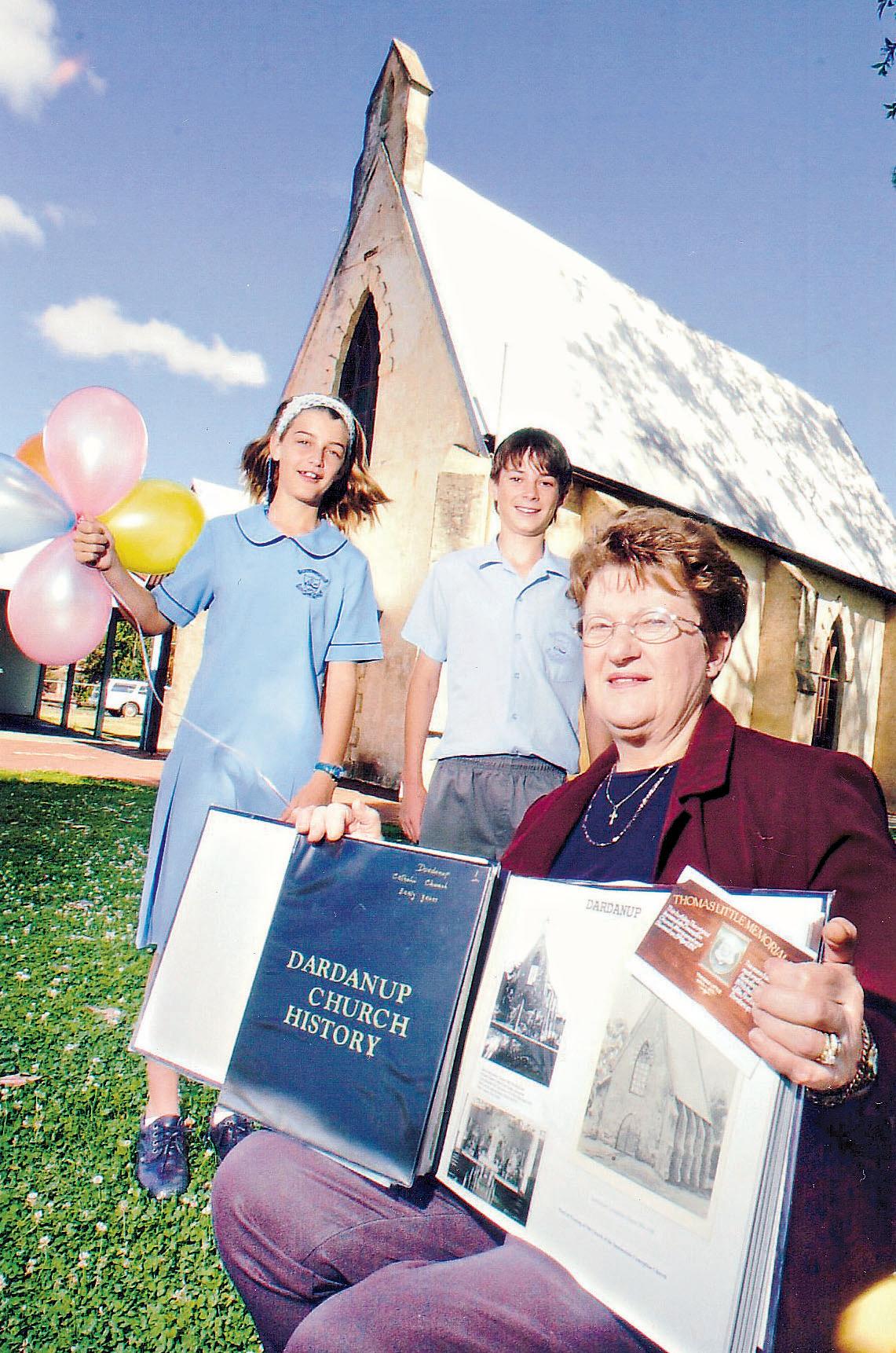
RETIREMENT NEVER LOOKED SO GOOD.
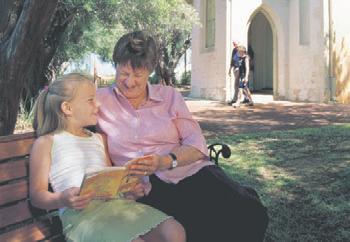
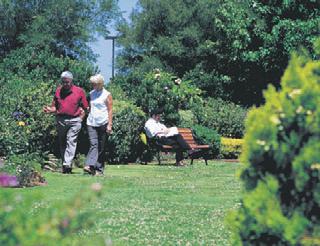

OVER 75% SOLD
House of prayer offers retreat
Inspired by the Benedictine contemplative tradition, the Hosea House of Prayer at the Immaculate Conception Parish in Dardanup provides the opportunity for private, directed and programmed retreats, spiritual direction and reconciliation and daily celebration of the Eucharist and liturgy.
Director Fr John Herbert, a Benedictine monk and parish priest of the Immaculate Conception parish Dardanup said the House of Prayer has quite a history to it.
The House is located next to the Church and Presbytery and has established a reputation as a peaceful place for prayer and reflection.
Originally built as a Mercy Convent in 1922, it was also used as a school downstairs.
During the 1920’s it was used as an enclosed Carmelite monastery.
Bishop Gerard Holohan said it is an important part of the history of the Bunbury Diocese and serves a great purpose for those looking for spiritual renewal.
“The good thing about it is that it’s used for personal and group retreats, with a Benedictine influence,” said Fr Herbert.
The House aims to encourage and build up in the spirit of the Second Vatican Council the aims of the Church, whilst being open to the values of ecumenism and inter-faith dialogue.
Its website credits it as providing the opportunity to explore and draw on the rich wisdom of the Rule of Benedict and other classic and contemporary literature of the western spiritual tradition.
Each year, Hosea welcomes more than 3000 guests from all over Western Australia. Hosea can be contacted on (08) 9728 1148.

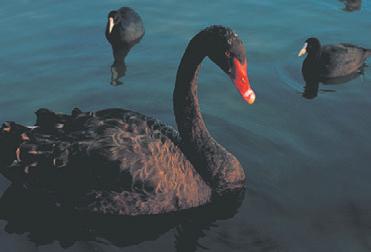

For over 155 years the Sisters of Mercy have provided wonderful aged care and community services from the Wembley site.
Now, as part of a program to expand and develop these important services, a substantial area of this historic site is being transformed into an over 55s village of world-class.
Mercy Village–Wembley will offer luxury apartments, villas and terraced villas in a safe, involving and superbly planned community, with its very own chapel.
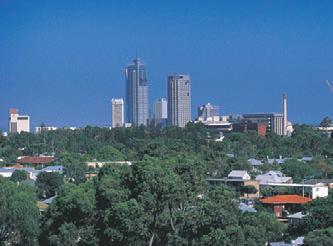

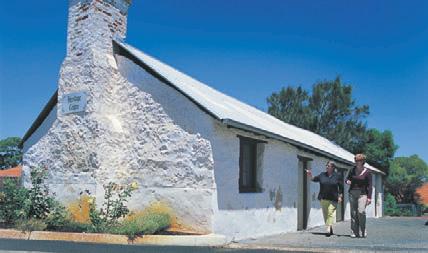

To find out more about the limited opportunities available to become a part of this incomparably well located, premium–quality village, simply telephone Karen Bailey or Chris Gaggin now on 1800 144 313.
Or visit the Sales and Information Centre located at the Catherine McAuley Family Centre, at 18 Barrett Street, inWembley.
You’ll soon discover that we’ve taken care of absolutely everything.
August 11 2005, The Record Page 3
MECA44
Immaculate Conception Dardanup parishioner Gwen Wells with students Shannen Leach and Rowan Brady from Our Lady of Lourdes Primary school Dardanup, on the occasion of the parish’s 150th anniversary.
Photo courtesy South Western Times
Making a difference two lives at a time
■ By Mark Reidy
On World Youth Day in Rome, 2000, Lydia Fernandez fell in love with Pope John Paul II. Lydia, who is the new Manager of the Pregnancy Assistance office, attributed the inspiration to explore her faith more deeply to this Pope.
Although she had been a practising Catholic all her life, she realised during her time in Rome that she had never truly embraced the fullness of her Catholicity.
Her spiritual exploration led her to a group called “True Love Waits” and for the next year she found herself speaking to classrooms of teenagers on the virtues of sexual abstinence before marriage.
Desiring to know more about the Church’s teachings on sexuality Lydia found herself investigating Pope John Paul II’s teachings on the “Theology of the Body”. Inspired by his wisdom and desiring to further
 Lydia Fernandez
Lydia Fernandez
explore his insights, she moved to Melbourne to study at the John Paul II Institute for Marriage and Family.
Equipped with her new-found knowledge, Lydia graduated in March this year and within weeks of arriving back in Perth began her work at Pregnancy Assistance.
She hopes to help all people recognise the value of each and every life, especially the pregnant women who make contact with the agency.
Lydia was not surprised by the
MacKillop the highlight
■ By Kerry Louise Connelly
St Joseph’s Convent Chapel in South Perth was the setting for a special afternoon on Sunday July 24 to honour the tenth anniversary of Mary MacKillop’s beatification.
The concert was organised by the West Australian branch of the Mary MacKillop Foundation, the organisation which provides funding for projects such as outreach centres, and which carries on the legacy of Blessed Mary MacKillop.
Mary MacKillop was born in 1842 in Melbourne, Victoria, the eldest of 8 children.
During her young adult life she felt her vocation to live a life of poverty and service to the poor.
She became a governess at 18 years of age to her relatives in Penola, South Australia, where she met Fr Julian Tennyson Woods who was the Parish Priest.
The collaboration between the two was to lead to the foundation of the Sisters of St Joseph of the Sacred Heart in 1866.
Eventually the sisters of St Joseph moved to Adelaide, where word began to spread of the works being done. Mary MacKillop cared for

anyone in need, from those in danger to orphans and the elderly.
Mary died in 1909 and her final resting place is in the chapel of the Sisters of St Joseph of the Sacred Heart in Sydney. The grave and chapel have also become a popular place of pilgrimage.
Sunday afternoon was the first time that St Joseph’s had opened the doors of its chapel to an afternoon of entertainment.
Talented entertainers Mary Croft and the Julian Singers volunteered their time to preform for a number of priests, nuns and supporters of the Foundation.
Established solo artist Mary Croft began the festivities with her renditions of ‘Make me a channel of your peace,’ ‘I have a dream’ and her signature song ‘One day at a time.’
Continuing the soiree were the Julian Singers, a group of over 20 choristers named after St Peter Julian Eymard.
The group, who will be celebrating their 13th anniversary as a choir next year, filled the chapel with their joyous versions of ‘Ave Maria,’ and ‘We stand for God,’ and ended the program on a high note preforming ‘With a voice of singing’.
After the mini-concert all were
Council of Christians and Jews
Western Australia Inc
10th Anniversary Celebration
Michael Peters
on the chapel organ
Corpus Christi College Choir
Presenting a selection of Christian and Jewish music
Rabbi Raymond Apple
Recently retired Chief Rabbi of Sydney’s Great Synagogue Speaking on “Christianity in the Eyes of Modern Jewish Thinkers”
Location: Christ Church Grammar School Chapel Queenslea Drive, Claremont
Date: 3pm, Sunday 28 August 2005
Donation: $5 to help defray costs
For further information, contact 9246 3170 (A/H) or evscott@iinet.net.au
statistics revealed in The West Australian on July 20 that indicate that one in four pregnancies in Western Australia was aborted last year. She believes it is a positive step for the public to become aware of the devastating number of abortions occurring. Her hope is that the public outcry will allow Pregnancy Assistance to become more widely known amongst other agencies as an alternative to abortion.
She says abortion is a life long choice and has seen firsthand its destructive effect on women, sometimes 10 or 20 years after the event.
Lydia, who also holds a degree in Health Science, would like to see the public made aware of the long term suffering experienced by many women who have chosen to abort their child.
But in the meantime, as she finds her feet in her new role, she and her team of dedicated volunteers will continue to try to make a difference…. two lives at a time.
What is Pregnancy Assistance?
Pregnancy Assistance is a service that provides support, information and material assistance to women facing crisis pregnancies as well as after childbirth.
The agency has been operating for nine years and reaches out to women of all backgrounds seeking help.
Services offered include: free pregnancy testing, confidential counselling with alternatives to abortion, accommodation, financial assistance and the provision of baby clothes and items needed for newborns.
Pregnancy Assistance upholds Catholic moral teaching on the sacredness of all human life as proclaimed in Humanae Vitae and Evangelium Vitae. The vision of the agency is to save the lives of babies and to save women
from the detrimental effects of abortion. Pregnancy Assistance provides women with hope and support for the future by offering them alternatives to abortion that they may not have realised were available or achievable for them.
Training Day
There will be an information/ training day on August 17 for anyone interested in becoming a volunteer counsellor.
Donations
Most funding comes through donations. Anyone wishing to make a financial (tax deductible) donation or to donate baby items can ring Lydia on (08) 9328 2926. For those wanting to speak to a counsellor regarding a pregnancy ring (08) 9328 2929

invited to the convent to mingle and share in afternoon tea, which proved popular with both regulars and newcomers.
Committee Secretary John McCormack said the musical treat was organised as a ‘thankyou’ to all who have supported the Foundation.
He also urged people to continue to support the works of Mary
MacKillop. Funds were raised on the day through donations and part-sales of Mary Croft’s compact disc recordings, which had been provided by the artist.
All donations raised are sent directly to the national office of the Mary MacKillop Foundation in Sydney Foundation fundraising events are conducted throughout the
Caring Lady

With over 20 years experience, Caring Lady Funerals is a name you can TRUST.
Specialising in Catholic Funeral Masses and servicing all areas, we provide unrivalled quality and care for you and your loved ones.
Caring Lady Funerals, when Service and Compassion matters most.
year. Coming up in the hear future is a raffle where the prize is an Australian one-day cricket team Tshirt signed by team members.
During the year a barbecue breakfast and movie nights are also held.
Those interested in the work of the Foundation or wishing to make a donation can contact John McCormack on (08) 9383 2615.
Bruckner Mass
In E Minor
Borodin & Strauss
Perth Oratorio Choir
Conductor Warwick Potter
WA Youth Wind Ensemble
Bruckner Mass in E Minor
Borodin Polovtsian Dances
Arranged by Warwick Potter
Strauss Wind Serenade Opus 7
Sunday 4 September, 2.30
Penrhos College 6 Morrison St, Como
Tickets $25 full $22 concession
Musgroves Zenith Tempest
9310 5980 or 9419 4030
Proudly presented by


Page 4 August 11 2005, The Record
1300 787 305 “A Caring Alternative”
Funerals
High note: the Julian Singers perform on July 24 for the tenth anniversary of Mary MacKillop’s beatification. Photo: Kerry Connelly
Greek students’ visit to Perth ‘a privilege’
■ By Jamie O’Brien
Catholic and Greek culture joined forces at St Charles Seminary in Guildford with the arrival of three seminarians from the Rizarios Ecclesiastical School in Greece.
Dimitrios Kaikis, 22, Costas Vasilaris, 18, and Dimitris Chiouis 17 have come to experience the academic, social and pastoral way of life in St Charles Seminary.
Accompanying the three men is Mr Panayotis Tsakiris, a member of the Board of Trustees of Rizarios and co-ordinator for the exchanging committee.
The visit is the second part of an exchange between St Charles Seminary and Rizarios Ecclesiastical School.
Last year seminarians Clayton Mitchell and Paul Stokes travelled to Greece to learn and experience what life is like as a student at Rizarios.
They met the seminarians from Rizarios while in Greece.
Each of the students from Greece said they hoped they would be able to improve their English.
“I am pleased to be provided with an opportunity to meet the cultures and ideas of Australia and to gain a better global opinion, as prior to this visit I didn’t know much about Australia,” said Dimitrios Kaikis,
who is in his third year of theology studies.
St Charles Seminary Rector Fr Tim Corcoran said St Charles Seminary is privileged to host the visit.
Fr Corcoran said German Cardinal Kasper, who is also president of the Pontifical Council for Promoting Christian Unity, is aware of the visit and recently commented that the exchange is a significant step in ecumenical relations between the Catholic and Greek Orthodox churches.
Mr Tsakiris said he was grateful for the well-planned schedule the exchanging committee had prepared.
“We acknowledge, respect and honour the seminary life here at St Charles,” he said.
“We are very happy and lucky to live amongst them,
“This will be a lifelong experience for the seminarians from Rizarios; an experience that will follow them throughout their life.”
St Charles seminarians Paul Stokes and Clayton Mitchell said they were happy and open to the new and diverse experience of having the students from Rizarios in Perth.
“The way they express their faith has helped me to understand and value the Catholic tradition,” Mr Stokes said.
“Other students of St Charles

have been able to share in our experiences in a more direct way through this visit,” Mr Mitchell said.
Clayton and Paul have had the opportunity to visit Greek Orthodox churches with the Rizarios students
as well as sharing with them the Catholic liturgies and traditions.
The Rizarios Ecclesiastical School was founded in 1844. Its purpose is to educate the youth of Greece and especially those who have the inner
vocation, the divine call of preaching the word of God.
“These priests will become the teachers of the youth of the future generations of our nation,” Mr Tsakiris said.
Couple celebrates 50 years, 9 children and 20 grand-children
Fifty years, nine children and 20 grand children later, Trevor and Helen Corry were back in St Joseph’s Church, Subiaco, last Saturday night to celebrate their golden wedding anniversary and affirm the continuation of their wedding vows.
The couple were married in St Joseph’s on August 6, 1955.
Fr Denis Rochford MSC led them through their renewal of vows during the 6pm Mass last Saturday and presented a papal blessing from Pope Benedict XVI.
Family and friends joined them in the Parish Hall for a celebration during which their daughter Maree Stallard and her daughter Leteesha

presented a brief but colourful history of the couple, beginning with their first date and their first kiss and tracking them through their various homes, cars, and occupations.
At the time of their wedding Trevor was a mechanic working
Year of the Eucharist
The spiritual power of the Eucharist is just like light. It is pure and is received by those who are to be enlightened. Nor does it become less pure even when it passes through unclean ministers.
– St Augustine
We are drawn to the Sacrament of the altar not by curiosity, levity or sensuality, but only by firm faith, devout hope and pure love.
– Thomas à Kempis
for his father the late Bill Corry, of Scarborough. Helen was the first child and only daughter of Leo and Angela Ryan, of Balingup, but her mother had died during Helen’s childhood. She had completed her training and was working as a nurse at Princess Margaret Hospital.
Trevor was educated at CBC Leederville (Aranmore) and St Ildephonsus’ College, New Norcia where Helen’s three bothers also gained their secondary education. Helen was educated at St Philomena’s Convent in Donnybrook where she was the first student to complete her Junior Certificate. Their first child, Brendan, was
born in late July 1956 and was followed at various intervals by Angela, Louise, Gavin, Therese, Maree, Catherine (who died in a car accident as a teenager), Paul and Martin. The family lived at Scarborough, Wittenoom, Cunderdin and Cranmore Park at Walebing where Trevor learned the skills of farming before going on to be farm manager for the Benedictines at New Norcia and at Namban, north of Moora. Later he became farm manager at Keaney College, Bindoon whence the couple retired to Bullsbrook. They were active in parish and community life wherever they lived.
Join Pope Benedict XVI in prayer - July
Their children gained their secondary education at New Norcia, Keaney, Mercedes, Iona and Aquinas.
As well as being busy with her family, Helen renewed her nursing registration while at Bindoon and worked as a district nurse in the Gingin area and at Keaney, and became a Justice of the Peace.
The couple travelled extensively throughout Australia and overseas. Further travel seems likely.
In their retirement, Trevor has joined the Julian Singers and Helen is studying Italian, as well as maintaining her long association with the secular Franciscans.

“For World Youth Day: may this occasion draw young people everywhere to meet Christ and to welcome Him as Lord of their life.”
Mission intention: “For students from mission Churches in Rome: may their studies in the Eternal City be a time of spiritual enrichment.”
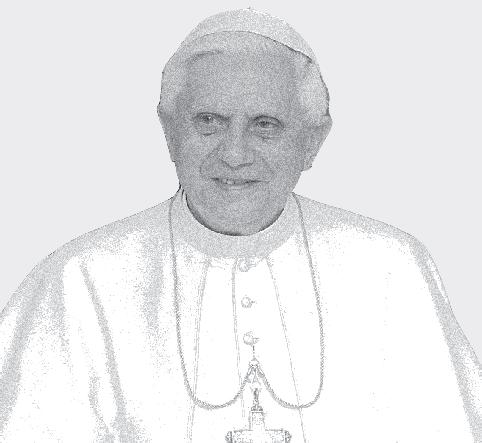

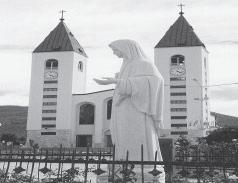
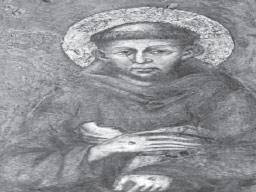
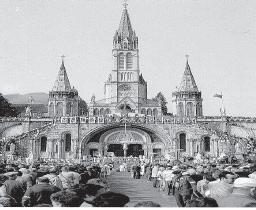
August 11 2005, The Record Page 5 Flightworld Travel Perth (08) 9322 2914 Travelscene Lords (08) 9443 6266 FREE CALL 1800 819 156 HARVEST PILGRIMAGE S GRACES OF FRANCE All prices listed do not include taxes Lourdes • Avignon • La Salette Taize • Ars • Paray le Monial • Nevers Chartres • Lisieux • Optional Paris Departing 18 September 2005 $4695 from Lic. 2TA 003632 Rome (3 nights) Medjugorje (7 nights) Visit this village of grace and peace where it’s reported Our Lady still appears daily. MEDJUGORJE Departing 8 September, 8 October and 30 October 2005. Medjugorje only option also available from $2895 $3490 from GRACES OF ITALY Departs 30 Aug & 29 Sept 2005 $4795 Padua • Venice • Ravenna • Florence Siena • Assisi • Loreto • Lanciano San Giovanni Rotondo • Monte Sant Angelo • Pietrelcina • 13 days Optional Rome extension Optional Medjugorje link from
In the spirit of things: Paul Stokes, left, Clayton Mitchell, Fr Nino Vinciguerra of St Charles Seminary, Rizarios co-ordinator Mr Panayotis Tsakiris, St Charles Rector Fr Tim Corcoran and Rizarios seminarians Dimitrios Kaikis, Dimitris Chiouis and Costas Vasilaris in the grounds of St Charles on Wednesday morning.
Photo: Jamie O’Brien
Trevor and Helen Corry
letters to the editor
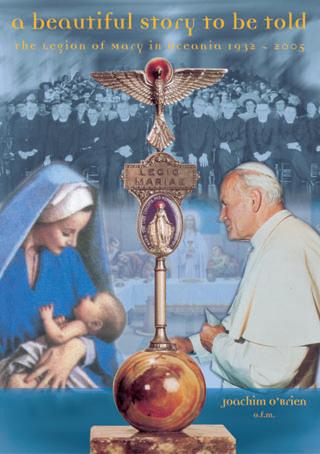
Perspectives Around t he tabl e dnuorA t
Figures disturb
It was disturbing to see the report (The Record, 21 July) on the high prevalence of HIV in the world.
discovery scores
This is just a quick note to say that issue 18 of discovery was great from my point of view.
My students are usually forced to read this magazine in homeroom. Today, however, as I walked in with the pile of papers under my arm the students saw something they recognized on the front, Big Brother. They were so keen to get the magazine to read that a student actually came up and handed them out. For the next 15 minutes all the students were reading. It was great. The articles that really grabbed their attention were The shallowness of reality TV, Which iPod is right for you? and At the flicks. Some students even read other articles.
So in short you certainly captured the market this month if my students can be used as a guide. Keep up the good work.
Name and address supplied
do not rest content until all people know, love,and serve Jesus Christ as their Saviour
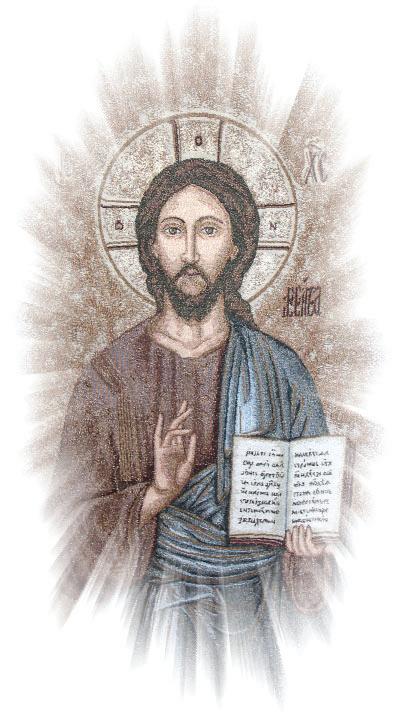

Are you being called to be a Passionist ?
“The Passion of Jesus is the Greatest Sign of God’s Love.”
Saint Paul of the Cross (1694-1775)
Who are Passionists ?
Passionist men and women are ever mindful of God’s love. They:
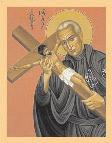
- preach the Passion of Jesus - reach out to all in times good and bad - are a t the forefront of the world’s suffering – today’s crucified - minister passionately the power of love.

Pope John Paul II said in 2000: “The death of Christ is the source from which you Passionists must draw your own spirituality in a very particular way: to love where it is most difficult to love.”
Since Saint Paul of the Cross founded the Passionists in the 18th century, they have grown into a family of priests, brothers, sisters and companions, serving in 55 countries throughout the world.
Link to Australia at www.passionists.com or Internationally at www.passionistworld.org
Passionist Vocations: PO Box 12, Marrickville NSW 1475. Email: hcc@passionist.org.au
While Cambodia and Thailand have the highest rate (850,000 cases according to UN figures), the Phillipines has the lowest (9,000 cases). Unlike the rest of sub-Saharan Africa, Uganda had been very successful in curbing AIDS. Malta, in Europe also has one of the lowest rates.
According to Dr Rene Bullecer who has spent 20 years in the Phillipines helping AIDS sufferers, all these countries have policies which stress sexual abstinence for the un-married and fidelity for the married. Catholic moral influence is also an important factor.
John R Barich Claremont
The French way
F. Bellet (The Record, July 14) thinks that the French have to be perpetually grateful for being liberated by the English and Americans in WWII. Henceforth the French must have no opinions of their own. As for them not winning a war in living memory, neither did England. The Americans and, even more the Russians, defeated the Germans in the last war. England just went along for the ride.
I think this sort of francophobia should never have appeared in a Catholic paper. name and address supplied
Reality TV bites
Congratulations on your excellent essay The Shallowness of Reality TV printed in the July edition of Discovery.
You summed it all up by saying “There’s a big motive for producers to the lowest common denominator button, push the moral and situational envelope to the ‘max’ so they get the biggest audience.”
It is a sad reflection on our times and also hard to understand that so many people actually do come from the lowest common denominator camp.
Keep up the good work.
G Carr Perth
Evolution?
The Theory of Evolution is a naturalistic explanation for the origins and diversity of life on earth. Although various spins have been put on it over the years to make it more palatable, including theistic evolution, it is not contingent on a creator. While people can be forgiven for thinking evolution is an established ‘fact’, the media and educational establishment have played a pivotal role. There remain serious objections to the theory.
So before we consider whether evolution and faith are compatible, it is incumbent on all to be aware of what evolution is and whether or not these objections are valid.
For example, there is no credible explanation of how the first life forms evolved. Furthermore, while there would be general agreement among scientists that there is overwhelming evidence of variation within a “kind”, there is no credible evidence to show that one kind of animal changes into another.
It has also been shown that the supposed mechanism of evolution, natural selection and mutation, does not produce new genetic information and therefore it is impossible for higher life forms to have evolved from lower life forms in this way.
While it is accepted that there can be no conflict between faith and reason, it is worth remembering that God does not require the testimony of man to validate his creation.
He exists outside of time and space and has given us no undertaking that he is limited by the laws of physics or our understanding of them.
Dr AT Holohan Beaconsfield
The best doctor
After reading the article by Derek Boylen (Record July 14) on the discussion forum
for parents of young children on free to air television, the scripture from Matthew 10:2829 and 32-33 came to mind. Most of the parents’ answers appeared to be at odds with Jesus’ Teachings. If we all followed his teachings the world would be a better place, after all he is the best psychiatrist, and going against his will is the cause of many of today’s problems.
If only we realised God’s love for us we would be in awe of him.
Jesus is the same yesterday, today and tomorrow and he doesn’t change because society wants a different lifestyle.
M Hogan Cottesloe
What therapy?
The letter from Dr Margaret Ker published in The Record of July 21 regarding the article by Andrew Mullins ‘In Therapy We Trust’ would have been more effective had it not been very obvious that she too was writing from a particular philosophical standpoint which she does not spell out. It would also have been of assistance if she herself is taking part in the “excellent work being done in Australia on resilience building in young people”, or whether she is writing from entirely disinterested motives and, what is she a doctor of? Why is she telling us, she is one?
A Lindsay North Perth
Criticism is misplaced
What with the ‘Rau row,’ the Chinese embassy member dilemma etc., I think we should hear no more of any other nation’s human rights shortcomings.
Norm Bernard Brigadoon
Letters Continued on Page 7
Page 6 August 11 2005, The Record
eh lbat e LETTERS TO THE EDITOR
Please contact: Fr Karol Kulczycki SDS PO Box 530, Joondalup WA 6919, Ph: (08) 9304 2907 www.sds.org.au <<<>>> info@sds.org.au Called Called TO PROCLAIM TO PROCLAIM g oo dness love GOD GOD kindness kindness JESUS JESUS life
life
mission given by Fr Francis Jordan SDS Founder of the Salvatorians
you have been
by
to proclaim Jesus Christ as the only one and true Saviour of the world join our Salvatorian mission... Read it in The Record The World - pages 8-9
If
called
God
When it comes to end of life decisions...
Who chooses?
 ■ By Fr Joseph Parkinson
■ By Fr Joseph Parkinson
Can a Catholic decide when to die? Can anyone else make this decision for a Catholic person?
WA Attorney-General Jim McGinty is proposing new laws to clarify current uncertainties surrounding decisions to withhold or withdraw medical treatment from dying persons.
The laws, being drafted now and due to be introduced into State Parliament later this year, will try to introduce some clarity into an area of great uncertainty in this state.
Mr McGinty is quick to emphasise that he does not intend to allow euthanasia in WA, and you can be sure there are many watching to keep the government honest on this score.
Even in so-called enlightened states like Holland and Belgium, euthanasia has proved impossible to control or even to monitor effectively once it has been made legal.
The proposed new laws will address two key issues: whether it is ever ethically acceptable to withhold or withdraw life-sustaining medical treatment from a dying person, and who should make that decision if the dying person is unconscious.
Since these are questions many of us will face at one time or another, it is important that we all know what the Catholic Church teaches on each issue - and where areas of uncertainty remain.
We will look at withholding and withdrawing treatment here, at the associated question of withdrawing nutrition and hydration in a second article, and at the decision-making process in the final article in this series.
In one way or another, all of the Church’s moral teaching is built on the absolute dignity of every human life.
This dignity is based on the fact that we are created in God’s image and likeness, and each one of us is loved absolutely and unconditionally by our Creator.
Since life is a gift of God, it is to be protected and promoted at every moment of life and regardless of the physical condition of the human being in question: rich or poor, male or female, healthy or ill, born or unborn.
But as people of faith we also understand that our life on earth is not endless. We are born for eternal life, but we can gain that life in its fullness only through our physical dying.
Therefore, while we protect and promote human life at every stage, we also accept the inevitability of dying. But we do not view death as a defeat: it is rather a necessary step in our passage to eternity.
Consequently we are able to hold two important positions simultaneously and without contradiction.
On one hand it is never acceptable to take an innocent human life deliberately, whether as an end in itself or as a means to obtain some other end - for example, for personal gain.
This is the essence of the Church’s objection to euthanasia, which is the deliberate taking of an innocent human life in order to free that person from discomfort.
Euthanasia fails to respect the absolute dignity of human life because it holds other goods (comfort, for example) as being of higher value.
On the other hand, however, it can be morally acceptable to allow a dying person to

continue to die naturally, rather than attempt to either slow down or speed up the dying process by medical intervention.
When made in appropriate circumstances, a decision to allow death to occur naturally and unimpeded does not devalue human life in any way.
Rather it accepts in practice the natural mortality common to us all, preferring to commend the individual into God’s hands by allowing nature to take its course.
This is actually another way of respecting the dignity of this person’s life, and we can emphasise our respect by providing the very best ‘palliative’ care - relief of symptoms, pastoral care, and so on - while the dying process continues.
The practical difficulty, of course, comes in determining the precise circumstances in which one may make a decision to withhold or withdraw a medical treatment with impunity.
Our Catholic tradition has isolated three conditions under which it may be ethically acceptable to withhold or withdraw medical treatment from a dying person.
These conditions form a kind of ‘test’ which can tell us if a proposed treatment is ethically obligatory or ethically optional.
If it is optional, then of course it would be ethically acceptable to withdraw it (if it is already being administered) or withhold it (if it has not yet been initiated).
The first condition concerns the availability of the treatment: it is perfectly understandable that a treatment cannot be ethically obligatory if it is not reasonably available.
For example, some forms of surgery might be so specialized that they would not be available in every town or city in the country. Is
a Perth patient obliged to go to Sydney, for example, in order to seek treatment?
But since Australia has a first-class medical system and excellent transport, this condition would probably occur only rarely in this country.
A second condition concerns the likely effect of the proposed treatment: once again, it is perfectly understandable that a treatment would not be obligatory if is not likely to benefit the patient.
So if a life-threatening disease has progressed to the point where the only available treatments promise no real hope of benefit, then the patient is not obliged to accept any treatment at all.
For example, some forms of disease progress so rapidly and are so virulent that a proposed treatment might offer, at best, only a few extra days or weeks of life.
A patient in this case could be perfectly justified in refusing that treatment, on the grounds that it is ultimately of no real therapeutic benefit.
Of course, another patient could be justified in accepting the same treatment, because he or she would like those few extra days to ‘wrap up’ some of their personal business.
Here we see the significance of the question ‘who should make the decision’: sometimes the patient has personal reasons for deciding, which no other individual could possibly understand.
Finally, a proposed treatment is ethically optional if the patient considers that it would impose an unreasonable burden upon them.
For example, a patient might choose not to have a proposed treatment because they prefer to live their remaining time in relative comfort, rather than undergo very invasive
surgery and a lengthy, uncomfortable recuperation.
Once again, another patient in a similar situation would be perfectly justified in having the same surgery, precisely because they judge that the treatment and its consequences are not unreasonably burdensome to them.
These three conditions outline a traditional moral principle which goes by various names, but which I call the Principle of Morally Disproportionate Treatment.
In summary: if a proposed treatment is not reasonably available, or promises little or no therapeutic benefit, or would be unreasonably burdensome to the patient, then it may be classed as ‘morally disproportionate’ and it could be refused or withdrawn with impunity.
As the examples above illustrate, in one case a treatment might be classed as ‘optional’ or ‘morally disproportionate’, but the very same treatment in another case might be considered ‘obligatory’ and ‘morally proportionate’.
Everything depends on the actual circumstances of the particular case, and it is impossible to make good ethical judgments in these situations if we are not in possession of all of the relevant medical, personal, and ethical facts.
Good ethical judgments, therefore, cannot be made in isolation from the facts of the case. We will see how important this is in the next article in this series, when we consider the cases of BWV, Terri Schiavo and Maria Korp.
Vista August 11 2005 Page 1
Fr Joe Parkinson is the director of the LJ Goody Bioethics Centre in Glendalough. The above article was prepared as part of talk on medical treatment for the dying.
Three wise men give us 150 years Popular priest reaches 50th milestone
God looks after everyone in his own way and time, says jubilarian
■ stories by
Peter Rosengren
The eyes, perhaps, could not see as well as they once did, and the hands were not quite so steady as yesteryear; the occasional step faltered slightly.
But there was no doubting that the spirit was still strong as Fathers Anton Hesse, Michael Brown OFM and Dan Foley concelebrated Mass at Good Shepherd Parish in Lockridge on Monday night 50 years after they were ordained in St Mary’s Cathedral in Perth.
In so doing the three priests, known from one end of the Archdiocese of Perth to the other, were also celebrating a milestone not seen so often: 150 years of priestly service between the three of them.
Gathered with them on Monday were classmate Emeritus Bishop Peter Quinn of Bunbury, Archbishop Barry Hickey, Fathers Vinh Dong and Vittorio Riccardi of Lockridge and approximately 40 other priests.
Adding to the unique nature of the occasion was the fact that three seminarians accompanied by Mr Tsakiris from the Rizarios Ecclesiastical Seminary in Greece, who are in Perth visiting the archdiocese and St Charles Seminary in Guildford, were present.
Also present were family and friends from near and far to mark the achievement.
Father Brown OFM was the odd man out – or, as he remarked during his homily, the ‘odd man in.’ He almost never made it to the priesthood.
While Fathers Hesse and Foley, with whom he was ordained by Bishop Goody of Bunbury, are diocesan priests he is a Franciscan.
Initial attempts to enroll at St Charles Seminary after serving in the airforce during World War II were refused twice by the-then rector, Fr Goody, on the ground that he had not studied Latin and Greek.
Despite the rebuff he was later to develop a great affection for, and friendship with, Fr Goody who, as Bishop of Bunbury, was to ordain him.
After having attended Christian Brothers College in Highgate the young Michael Brown met Fr Winston, a Franciscan.
Fr Brown told those present at Lockridge on Monday how he had told Fr Winston he had been refused by the archdiocesan seminary twice and, from where he stood, it looked as though he would never make it to the priesthood.
Fr Winston had agreed, but told him that if
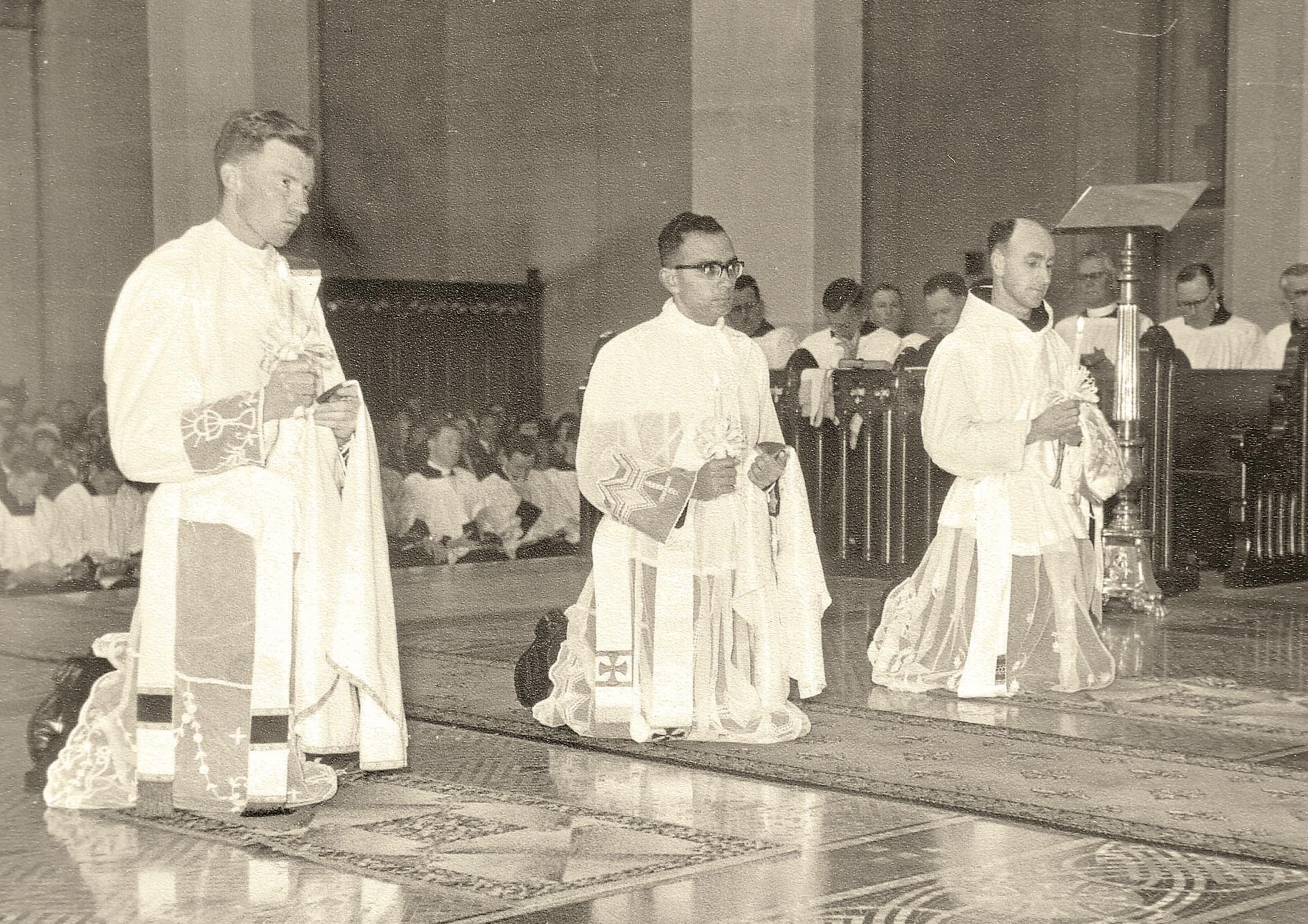
he wanted to try a third time he could try his luck with the Franciscans. The rest, as they say, is history. And that, as Fr Brown said, “is how God looks after all of us – in his own way and in his own time.”
His attitude, therefore, was gratitude.
“I thank the Lord that it has turned out this way,” he said.
Of the three, Michael Brown was the late vocation – late, that is, by the standards of the day. While his fellow ordinands were still in their 20s when they were ordained, he was 33.
By the time he had reached half a century of priesthood he had done just about everything, from working in parishes to working with delinquent boys in Victoria.
Father Brown is also unique in that he was the first Western Australian to become a Franciscan.
Born at Wyalkatchem in the wheatbelt, he said he was grateful to God for the privilege of being a priest. It was all he and his fellow
priests had ever wanted.
“Sometimes I’ve been asked by young people ‘is this really the life you want?’,” he told listeners.
“And I’ve said ‘I don’t want any other sort of life. This is the life we’ve been called to live. This is the life we want to live - to the end of our days.”
And reflecting on the evening he said he hoped the lives of the three priests might help point others in the right direction.
“I hope it will be an inspiration that others will answer the call, to the priestly or religious vocation, whatever it may be, and that the three of us will continue to build up the body of Christ and sanctify ourselves,” he said.
But above all he and his fellow priests were simply grateful.
“How grateful we all are in our hearts for the things that have happened, and all the wonderful people we’ve known; we pray that God will bless them and strengthen them,” he said.
Meanwhile, each day he recites a simple
prayer, he told his audience.
“I pray ‘Lord, fix up everything I did today that was wrong. Make up for everything I’ve left undone, that was unadmirable or messed up.
“Bring everything I’ve done that’s good to perfection. I can’t do anything perfectly – but you can, Lord’,” he told his listeners.
Afterwards, Archbishop Hickey offered congratulations to the three men on their lives and their ministry on behalf of the whole archdiocese.
When a priest is first ordained, he said, he learns that ordination is not a prize for himself but a gift for the good of the people.
“And we’ve seen that carried out in the lives of Fathers Foley and Hesse and Brown, and carried out in a great spirit,” he said.
Later, Fr Hesse told The Record he was just happy.
“I wouldn’t have anything different. I would have it all over again, just the same,” he said.
Continued on Vista 4
Fr Dan scores 50. But there was always someone else involved
Was the special papal blessing from Pope Benedict presented to Perth priest Fr Dan Foley in Lockridge on Saturday night the first given by the new Pope to a golden jubilarian priest?
Parish Priest Fr Vinh Dong thought it was likely, as he made the presentation in front of a church filled to standing-room only, with another 100 or so people seated in the cold night air outside.
If anything, the occasion was part-measure of how much a single life can touch other people deeply.
Approximately 700 people turned out on Saturday night at Good Shepherd parish to congratulate Fr Foley on his 50 years of priesthood.
‘Part-measure’, because it was quickly apparent that the tall lanky Australian priest ordained in Perth in August 1955 has won the love, respect and affection of thousands over the course of his life as a priest.
Fr Foley, for his part, tried with only marginal success to turn the spotlight away from himself and back on those who were there to wish him well and to thank God for their priest’s half century of service.
“Thank you for everything you are, and have been to me,” he said, repeating the phrase several times during his speech after Mass.
For the eastern-suburbs parish it was clearly a red-letter event. Well before the concelebrated Mass began crowds began turning up to the church while a flurry of activity took place in the parish centre as ladies prepared food and drinks for the after-Mass multitude.
The tall lanky Australian priest ordained in Perth in August 1955 has won the love, respect and affection of thousands.
A marquee was erected opposite the centre’s main entrance to help accommodate all those who turned up. Helium-filled balloons bobbed gently up and down against the ceiling of the centre lending a festive spirit to the occasion.
After Mass, Fr Dan was piped from the Church to the centre by a kilt-clad piper past a guard of honour made up of applauding and cheering parishioners and visitors.
In his speech after Mass Fr Dan reminisced more about the people who had influenced
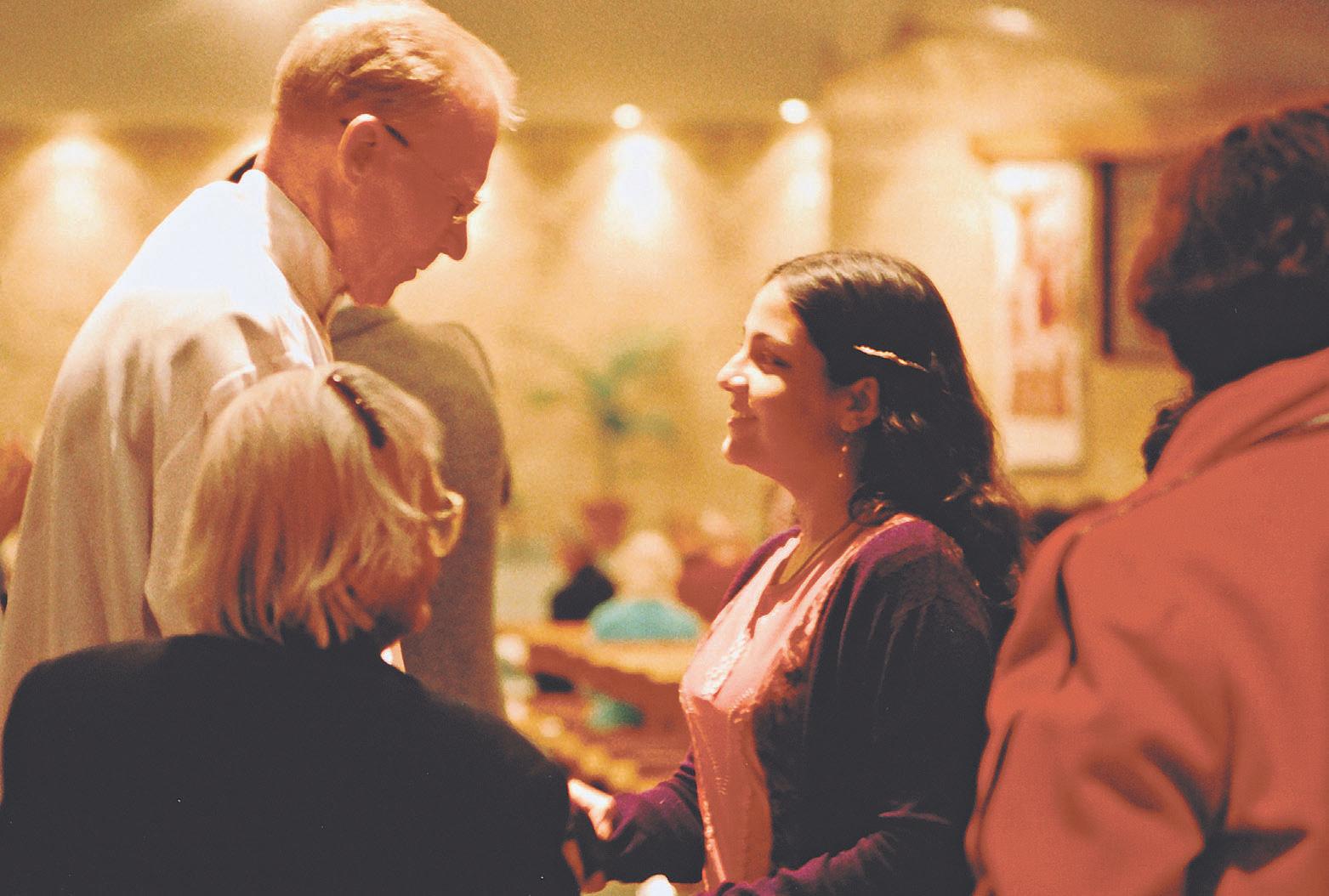
him than about himself. These included a taxi driver he met in Istanbul last year while visiting members of the Focolare movement with which he has been involved here in the latter years of his ministry. He has clearly been deeply impressed by the movement and its simple but challenging spirituality.
Italian woman Chiara Lubich founded Focolare in Italy during the Second World War. The movement has a strong emphasis on unity at all levels, between people, churches, faiths and nations.
Of the taxi driver, he said, “That man was a member of Focolare from Baghdad and would spend his days at work trying to see Christ in everyone he met.”
“We don’t think of taxi drivers from Baghdad trying to see Christ in everyone they meet,” he observed.
“It’s a very simple spirituality but nonetheless a very effective spirituality, promoting dialogues between different groups throughout the world,” he explained. The Istanbul visit had been a “wonderful” experience.
At Subiaco parish, one of his early appoint-
ments, a parishioner named Eileen Honner had made a lasting impression. She was, he said, far ahead of her time in her involvement in parish life.
Mrs Honner had had a special gift for spotting the talents and abilities in other people and drafting them into involvement in a host of parish activities or ministries.
He also offered advice to priests of all ages; all priests need to focus on constant renewal of themselves and their ministry. This had been one of the important lessons he had learned over the previous half-century.
For Fr Dan, those experiences of renewal had been found, among other things, in his involvement with the Marriage Encounter movement and, later, Focolare.
Both had been intensely rewarding experiences; in the case of the Marriage Encounter years, he said, “they were enriching years.”
Fr Foley said that in Marriage Encounter, with which he eventually became “deeply involved” and supportive as a presenter on weekends with married couples, a key experience is the encounter with one’s self. This
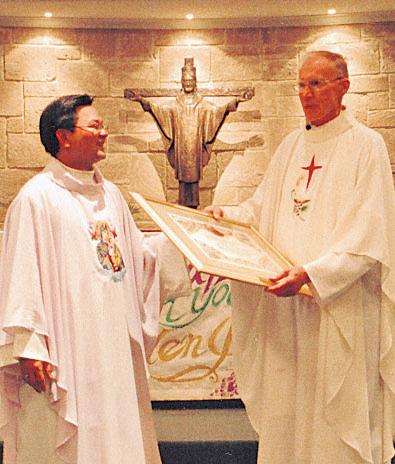
reflected the central message of the Gospel of repentance, conversion and change of heart in one’s own attitudes, leading in turn to a renewal of one’s whole life.
“It enabled me to look beyond the externals and focus on the spirit, both of Vatican II and of what we are meant to be,” he said.
Paying tribute to the movement he owed “a great debt of gratitude” to the couples involved with Marriage Encounter for enriching his priesthood. Through the experience he had been able to renew himself and to become a better priest, he said.
Meanwhile, he had developed the daily habit before celebrating Mass or administering the sacraments of trying to focus on what God wanted him to be and to do each and every time.
Continued on Vista 4
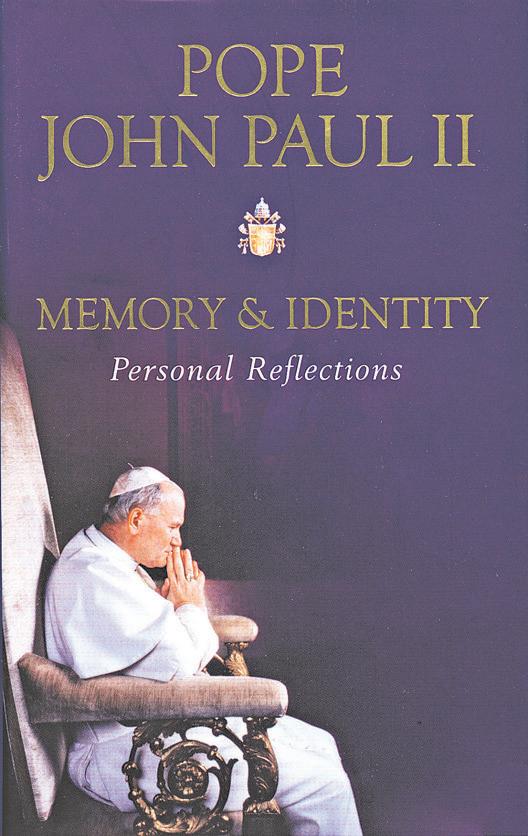


MEMORY AND IDENTITY
Personal Reflections
By Pope John Paul II $27.00
When the world remembers Pope John Paul II, what themes from his papacy will come to mind? In this philosophical meditation, the Holy Father reflects on values he deems critical to the destiny of humankind, with freedom and the value of life underlying all others.
Pope John Paul II’s theology of evil and suffering was forged in the crucible of Nazism and communism in his native Poland, as was his belief in the importance of cultural identity. He points out that “evil, in a realist sense, can only exist in relation to good, and in particular, in relation to God, the supreme Good,” which underlies even the darkest moments in history with the promise of redemption and hope. His encounters with those dark moments lend credibility when he writes, “All human suffering, all pain, all infirmity contains within itself a promise of salvation, a promise of joy…”
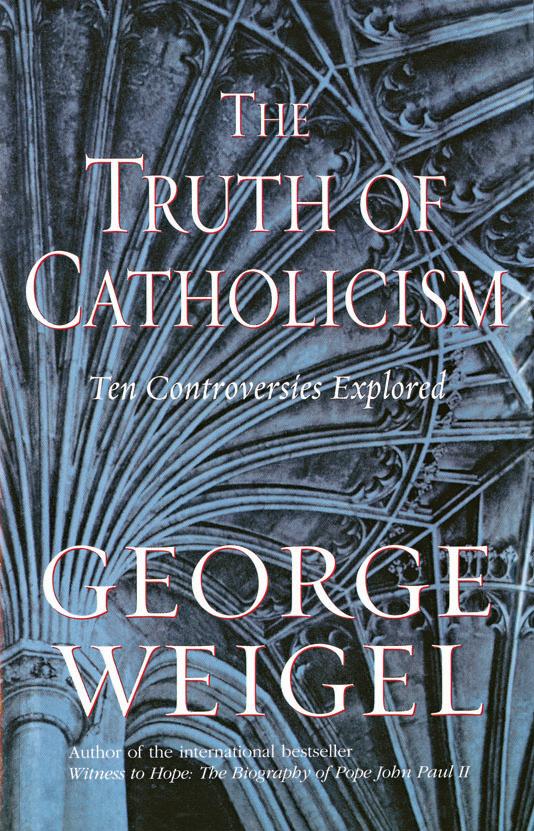


THE TRUTH OF CATHOLICISM
Ten Controversies Explored By George Weigel
$25.00
In The Truth of Catholicism, John Paul II’s biographer George Weigel tackles 10 of the most controversial and complex questions for which the Catholic Church provides answers. The subjects of these questions include the uniqueness of Christ, the meaning of freedom, the dignity of human life from conception until natural death, and the use and abuse of sex. Weigel explains how the Catholic stance on these isses is a celebration of human life and human love, even as they challenge us to imagine a daring future for humanity and for ourselves.
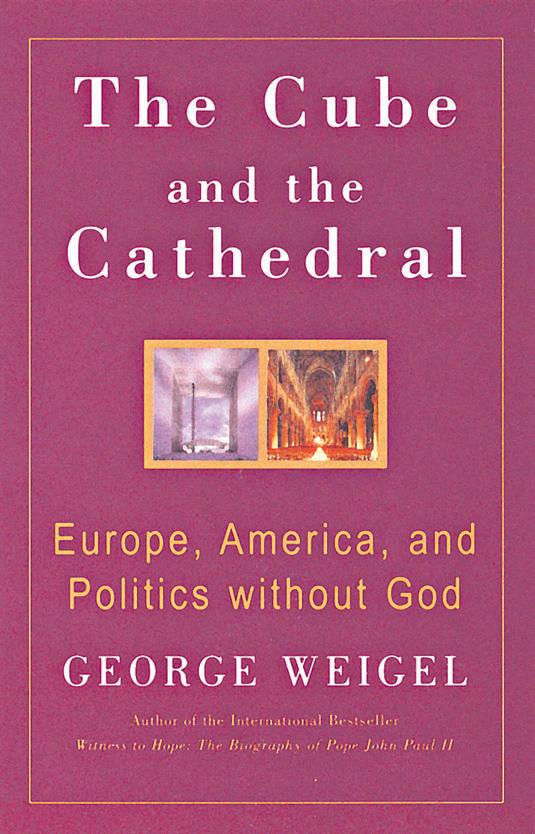


THE CUBE AND THE CATHEDRAL Europe, America, and Politics without God
By George Weigel $25.00
What is the significance of the European Union’s refusal to acknowledge Europe’s Christian roots in its new constitution? How does this relate to western Europe’s demographic suicide - which is putting huge burdens on the European welfare state and creating a vacuum into which Islamic immigrants are cascading? And what does all this mean for America? In
The Cube and the Cathedral: Europe, America, and Politics Without God, George Weigel offers a provocative analysis of what he sees as the beginning of Europe’s demise - and what America stands to lose as a result.
These great reads and more are available NOW! from The Record Contact Eugene on 9227 7080 or e-mail administration@therecord.com.au Page 2 August 11 2005, The Record August 11 2005, The Record Page 3 Vista Vista
Adored by young and old: Father Dan Foley greets a wellwisher last Saturday evening, while Parish Priest Fr Vinh Dong, at right, enjoys the moment after presenting Pope Benedict’s papal blessing. A century and a half: Fathers Anton Hesse, Dan Foley and Michael Brown OFM kneel in St Mary’s Cathedral, Perth, at their ordination ceremony on August 6 1955. The three marked their 50th anniversaries early this week at Good Shepherd Parish in Lockridge.
Students gain clear meaning of poverty
■ By Jamie O’Brien
Students from Mary McKillop College in Busselton recently had the experience of a lifetime in East Timor.
Chris Quin, James Versteegen, Sara Davies, Cherie Strickwerda and Sharnee Bear - together with teacher Stan May – spent two weeks in Dili and Baucau, East Timor, as part of a cross-cultural experience.
Each of the students agreed the experience helped them to gain a clearer understanding of poverty and a different culture.
They also had the opportunity of taking with them funds they raised to donate to the Bakhita Centre in Ermera, East Timor.
The Centre offers the East Timorese people an opportunity for developing skills, experience and services to benefit individuals and their communities.
The funds raised by Mary McKillop College will go towards improving health and education for the people that go to the clinic.
James Versteegen said it was pleasing to see how the East Timorese people had managed to progress since the visit by other students from Mary McKillop College last year.
“This year they had desks and chairs,” he said.
Cherie Strickwerda, said the experience helped her to broaden her mind in a global way.
Cherie, who told how the students visited a number of different schools, said it was both fascinating and eye opening “to see how different the schools are to what we are used to here in Australia.”
“In each grade, the students were a variety of ages, some up to the age of 20, because of interruptions in their education from the previous violence by the Indonesian militia or having to help their family with work.”
“Their buildings were in a poor state, often there was no glass in the windows and classrooms consisted only of desks, chairs and a blackboard,” she said.
“There were no computers, posters on the wall, fans, lights, whiteboards bookshelves or cupboards.”
Sara Davies said she realises that each of the students had a different reaction to being in East Timor.
“Some people might see it as dirty, smelly and a tragic example of the country’s poverty, for others, including myself, it was an amazing place, full of life and personality,” said Sara.
“The dirty streets, the ruined buildings, stray animals and children, constant car horns and scents from fruit, fish and burning rubbish were a sign of Dili’s character and potential beauty.”
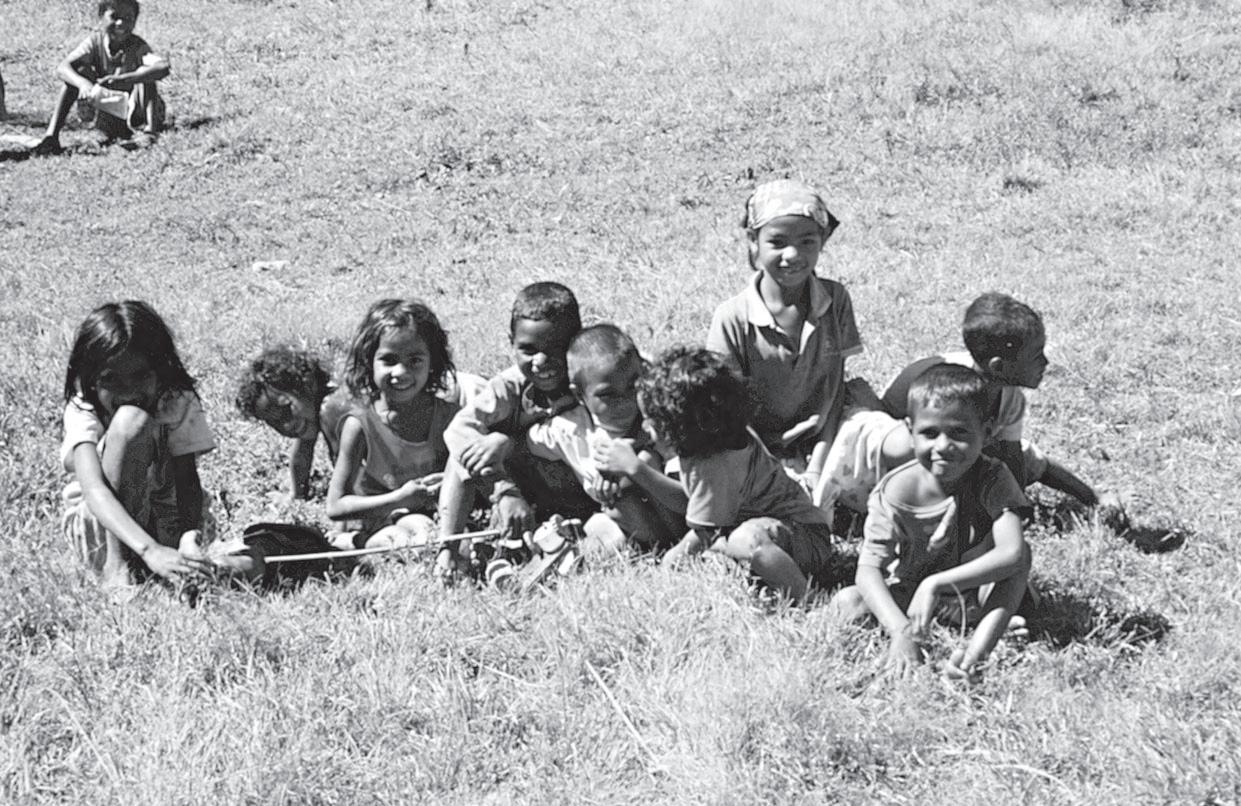
Sara explained how during their visits to the schools, together with Cherie and Sharnee, the three of them would introduce themselves using flashcards in Tetun; the local language.
“This was a little daunting for us, but it proved successful as it ena-

bled us to learn a little bit of Tetun and improved their already satisfactory English skills,” said Cherie.
The group from Mary McKillop College said they were also quite amazed to have met a doctor from Victoria and her family who were staying there as volunteers.
Chris Quin said the group was able to confirm the status of East Timor as a Catholic country after three days, when they visited a local Church.
“An unusual part of the East Timorese people’s culture we witnessed occurred when they were giving a goodbye speech and they would apologise profusely in case they had offended anyone,”
“At first we didn’t understand this but then we realised that it was a part of their culture.”
“It was very traditional,” said Chris
“All the women sit on one side and the men on the other”
“What I noted was the fact that it was very interactive,”
“Even though there is a choir the whole congregation sings and the
children seem to be more involved.”
The students also said they were overwhelmed by the East Timorese people when they distributed some 500 rosary beads.
Teacher Stan May said he realised that although some of the East Timorese people lived in extreme poverty, they were content, friendly and genuine people.
“Their smiles were heartfelt and real,” he said.
“Never have the words blessed are the poor in spirit been more meaningful to me.”
Mr May also acknowledged the often ‘breath-taking’ scenery
“We spent a lot of time in Timor traveling around in the back of a truck,” he said.
“The mountain roads in Timor could probably best be described as a collection of pot holes,”
“However the relaxed pace allowed us a remarkable view of the countryside.”
James, Sara, Cherie, Chris and Sharnee all agreed they would like to go back because they realise how much help is needed.
A unique experience A beautiful and wonderful story
Continued from Vista 2
“And I feel overwhelmed that God has preserved me so long to be of service to his people. I’m very grateful to the good Lord for having given me the people to serve, and to be a part of their lives.
It’s a time of thanksgiving,” he said.
Even now he recalls his experiences while at Kalgoorlie as being among the most interesting ones he has had.
In Kalgoorlie of the 1950s a priest travelled not only the dusty roads of the goldfields but also the railways to minister to people.
Fr Anton would periodically have to visit and service “people there on the old tea and sugar train – the train that serviced those Trans-Australian line settlements.”
He would obtain use of a carriage from the railways and use it to celebrate Mass for people
and for administering the sacraments.
Sometimes he had to rough it.
“I remember going out once and sleeping under the carriage because we couldn’t find the siding,” he said.
Highlights of his career? Each placement, he said, had brought its own unique experience. One that springs to mind was the changes introduced because of the Vatican Council.
“The transition from Latin to English didn’t affect me that much because to me it was quite a normal procedure, one of the things I welcomed – I took to it like a duck to water.”
And on advice to young men going on to become priests?
I would ask of any young man the one thing I have always followed and would like to offer… whatever you do, particularly as a priest, ask yourself ‘how would Jesus do it?’ Just try to do it the way Jesus did.”
Continued from Vista 3
Fr Foley recounted one experience that had illustrated more powerfully for him that the priesthood is always from, and about, Christ.
During the presentation of a homily in his then-parish, Leederville, he had lost his train of thought. It had taken more than a few seconds to recollect himself and carry on, even though, at the time, he still could not recall the original point he had wanted to make.
After Mass he was sitting in the Church trying to gather his thoughts and remember what it was that he had wanted to say.
A woman who had been in the congregation approached him as he sat in the pews, requesting he hear her confession – the first she had made in 16 years. She had been moved, she said, by what he had had to say in his homily.
“For the life of me, I couldn’t remember what I’d said,” he told
his audience on Saturday evening with a smile. “But I became very aware that there’s someone else always involved,” he added.
For a young priest who, like most of his generation, thought they had been pretty much theologically educated for life, Vatican II had changed everything. Learning to adjust to its new way of thinking had meant a second learning experience 10 years after being ordained.
Nevertheless, he said, “there’s till a tremendous amount to do in implementing the Council. We need to revisit it and re-read it constantly.”
But at the end of the day, he told those present, his life had been about just one thing.
“Over these 50 years I’ve been telling a story. It’s a very beautiful and very wonderful story.
“And it derives its beauty from the fact that it’s true.
“It’s the story of our God who loves all of humanity in all its brokenness with the totality of uncon-
ditional love. “That love was made visible in his son, who became one of us, and who died for us so that we could share the life of God forever.
“And that,” he added, “is the story we celebrate and make present each time we celebrate the Mass.”
Fr Foley plans to return to Manly Seminary in September where he studied for the priesthood for a class reunion.
Of the original 32 ordained to the priesthood there are still 14 priests who plan to be there.
“In 1955 I never thought I’d last this long,” he said, adding quickly “I’ve got two legs under me that still work.”
Two other priests celebrated their 50th anniversaries with Fr Foley on Monday evening this week: Fr Anton Hesse and Fr Michael Brown OFM.
Archbishop Barry Hickey and many other priests of the archdiocese joined all three, who have 150 years of priesthood between them.
Page 4 l August 11 2005, The Record Vista
Top: East Timorese children playing in a field where the students from Mary McKillop College Busselton visited recently. Below left: Chris Quin, James Versteegen,. Sara Davies, Cherie Strickwerda, Sharnee Bear, with teacher Stan May and new found friends in East Timor. Photos courtesy Stan May
Tom makes dramatic dream a reality
■ By Kerry Louise Connelly
Anyone who has love for the theatre may have recently seen a fresh new play entitled The Dreamer
Written on and off over a period of three years by marketer Tom Pavey, “The Dreamer” refers to the way Jesus was seen by those in power.
Although a biblical drama, taking much of its content from the gospel, The Dreamer is as much fictitional as it is educational, A fact that Pavey himself has made known, especially for young audiences and educational groups.
“The play is creative and not completely factual, however it gives the audience a feel of what could have been the reality at the time, Jesus would not have lived in a soft
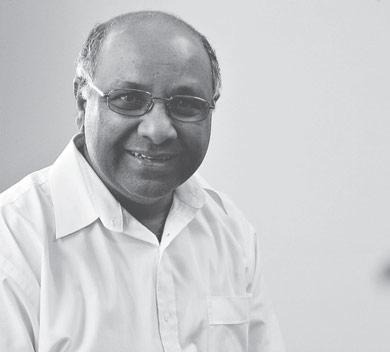
world,” Mr Pavey said. The play is set in the time of the Roman empire when women were treated as inferior and the word of Jesus the Nazarene was quickly spreading. The plot focuses on a conversation between Caiaphas the high priest and Jonathan his successor, and their scheme to destroy the Nazarene and obliterate his teachings.
t he tabl
Continued from Page 6
Abortion
I refer to the front page story of the West Australian of July 20, reporting that in Western Australia one in four pregnancies end in abortion.
One might tell a story about a country that had abundance of almost every thing.
It was a large and peaceful land and its enemies were far away.
There was plenty of room for growth with wide-open spaces.
It was full of every imaginable resource be it plant, mineral or animal.
It was much better than that other fabled rich land full of milk and honey.
Almost every one had enough to eat and there was shelter for all.
The majority of people were highly educated, meaning they were able to have good jobs, earn comfortable incomes and live well on the finest of foods and be clothed in the finest clothes. They did not want for much at all.
This nation had started hard and its fore-fathers had worked to make it great. The pioneers elected great leaders who ruled for the good of all and the people were pleased and multiplied and were good to each other and they became wealthy.
All was well in the country until one day this wealthy people became so greedy that they wanted more and more and were unwilling to share their good fortune with others - to such a degree that they eventually stopped breeding and were unwilling to even replace themselves. Of those that did become pregnant some twenty five per cent resorted to killing their unborn babies while the rest, including the chief ministers, turned their sight and minds from the slaughter lest it caused
Auditions to find the perfect actors to play the secular characters took place two and a half months ago in Fremantle.
The call out read for “Actors with exceptional retentive memory”
Pavey himself attended auditions to have a hand in the selection process. Five talented young actors from the Stargate Actors Academy of Perth landed the multi-layered roles.
“The actors are keen as mustard and I am very happy with those performers selected,” he said.
The process of scripting the 45 pages of The Dreamer began three years ago.
Mr Pavey was baptised and brought up Catholic as a child. It wasn’t until much later in his life that he felt a calling to start reading the bible, which he now keeps constantly by his bedside.
During his comprehensive jour-
ney, he became very interested in the gospel and the truth of the Nazarene. He decided to write a screenplay, in order to explore the conversations associated with, and the plot to destroy the Nazarene, and in turn, the universal mercy and acceptance of God.
Once Mr Pavey had completed a hard copy, he decided to undertake a writing course at “Stages WA” in Perth in order to increase it’s dramatic aspect, a course he cannot speak highly enough of. “Its such a good course that I repeated it,” he said.
It was during this time that the first read through of The Dreamer took place. Mr Pavey was taken aback by the response it triggered amongst the group. He said “It brought people to tears.” The response was reward for the many years he had spent working on it.
Many people were involved in
both the editing and in the action to bring the screenplay to life in the theatre.
Mr Pavey is highly thankful to Bishop Don Sproxton for his nurturing during the transition process, and Assistant director of the Black Swan theatre Tom Gutrige who has provided much support.
In addition gifted director Gale Lusted, also from the Stargate Actors Academy, whose artistic decisions added another depth to the story.
The Dreamer opened at the Nexus Theatre, Murdoch University, on the 11th and 12th of August. “There are hopes to eventually extend the screenings,” Mr Pavey said. Pavey plans to contribute any profit made to both Linda’s House of Hope and St Vincent DePaul.
“If Jesus were here today, I know that is what he would have done,” he said.
them to think, or to feel, or to speak out. For these were the times of weak leaders whose job it was to see that the nation’s wealth kept growing no matter what.
Then came the time when these people were disinherited of their country. It was given to others who were more deserving and there was a weeping and a wailing and a gnashing of teeth and the people cried out ‘save us, save our land!’ but alas, it was too late.
For they had been blind. They had failed to see that the real wealth of any land is its children.
Terry McDonnell Yarloop
The natural way
This is regarding the article on the front page of the Record dated July 21 2005.
I would like to suggest that the Archdiocese of Perth adopt the same system as the Archdiocese of Denver concerning pre-marriage courses.
The theology of the body course could be written by some of the young people of our Archdiocese who have gone to Melbourne to study at the John Paul II Institute for Marriage and Family and have returned.
If that is not possible then we could ask the Denver Archdiocese for their course.
We have been blessed to have in our Perth Archdiocese three highly qualified methods of Natural Family Planning, which we should utilise to their highest potential.
The Billings Method, Fertility Care and Natural Fertility Services. They all have highly qualified accredited teachers whom teach their own specific method.
Our late Pope John Paul II always spoke about “REEVENGELISATION”. What better way than to start with our young engaged Catholic couples.
By making these courses compulsory, the couples would see that the Catholic Church really cares about them and their future.
We should make sure that the couples start with a solid foundation to live out their Sacrament of Marriage with Love, Hope and Respect for each other and for God for as long as they both shall live.
Marilena Scarfe.
WA Inc bites
It is heartening to read the Editorial in the July 21 issue of The Record relating to “WA Inc Bites again”.
This again brings to our notice the need for constant vigilance on the actions and proposals from all levels of Government. It is their actions that contribute to the standard of moral and human rights that provide the social fabric for our community. Where they transgress these rights then we as a community must endeavour to have these rectified.
It is unacceptable to continually hear various members of Parliament saying “we could have handled it better”, “we could have done better” or “an enquiry will be held”. There is no excuse for not listening to and acting on the Christian views for just and moral outcomes to avoid unacceptable events happening.
The most recent incursion by Government has been the destruction of property rights whereby individuals are having their land classified as environmentally sensitive rendering their land, which was acquired with hard work and sacrificing many privileges to provide for their financial future, now valueless.
This “quarantined” land cannot be developed, has access restricted or even prohibited. Due to these draconian restrictions there have been no private buyers.
The only buyer is the Government who represents themselves as a “willing buyer” offering 10% of the market value of adjoining unaffected land. An amount so small it does not allow re-establishment on any other similar property. The Government substantiates this payment of a mere pittance by manipulation of zonings and valuations. This policy had been disclosed in the Supreme Court of Western Australia – Court of Appeal in Mount Lawley Pty Ltd v Western Australian Planning Commission [2004] WASCA 149 where it was stated by the three Appeal Judges at paragraph 224:
“Two valuers were called to give evidence on behalf of the respondent. They were Keith Wilson and Geoffrey Robert Elliott. Both were experienced valuers. However, each was constrained by his instructions to value only on the basis that the Mount Lawley land was zoned Rural and had no or limited development potential”.
The valuers had been instructed on how to value the land by the respondent, the WA Planning Commission. Had an individual instructed a valuer on how they were to value an area of land that they were buying to provide a financial advantage at the expense of the vendor then they could be charged with fraud and possibly jailed.
The Government’s reserving of substantial tracts of private land is at a time when it is rezoning and developing every available area of Public Open Space, vacant or unused land that it can develop without attracting substantial public objection and even when this occurs the public’s concerns are often contested by the Government. This government (public) land is being developed by Land Corp, now one of the larg-
est and most profitable State land developers; there being little or no cost of the land it develops, the envy of all private land developers.
It is not uncommon for the Government to have their own land rezoned for development whilst the adjoining privately owned land is reserved for public use. The hallmark of WA Inc? These actions are nearing the policy of land resumption adopted by Robert Mugabe in Zimbabwe.
This disregard for a just and fair outcome and ignoring moral responsibilities cannot continue.
As a community we must ensure that only the highest standards are dispensed at all levels of Government.
Ralph Prestage
The Coalition for Property Rights
Archbishop goes on air
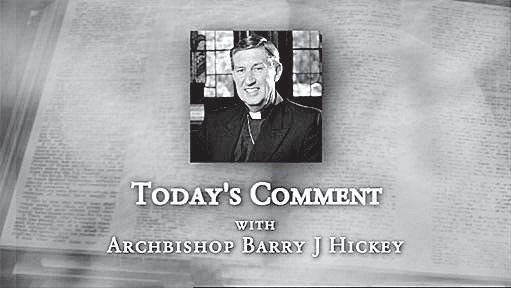
Archbishop Barry Hickey made the first of his four scheduled TV appearances in the first commercial break during the 6pm news on Channel 9 last Sunday.
His topic was violence and our attitude towards it.
The Archbishop has booked appearances for each Sunday in August.
The one-minute talks are expensive and their continuation on a regular basis will depend on financial support.
The talks are repeated between 6.30am and 7am on Tuesdays and Thursdays. They are also available immediately after they are televised on www.perthcatholic.org.au.
The website response was positive, with 150 hits by Monday night, with a dozen people leaving comments, all positive and encouraging.
The text of last Sunday’s talk was:
Welcome. Violence surrounds us in the
world today. Not just the violence of war and terrorism, but violence in our streets - even in our homes.
This is an appalling situation, but we accept it as the way life is.
We even react by wishing violence on those who commit violence.
The world can be different if we reject violence and instead choose love, forgiveness and reconciliation.
Those who have the courage to keep their hearts and their minds free of violent impulses enjoy peace and freedom. They also build peace and freedom around them.
Put your faith in love and forgiveness at home, at work, wherever you are, and you will build a better life and a better world.
This is God’s way.
I am Archbishop Barry Hickey
The topic this Sunday is private and public morality.
Tom Pavey
August 11 2005, The Record Page 7
Thornlie
LETTERS TO THE EDITOR
Around
e dnuorA t eh lbat e
letters to the editor


The World
Lay movements have support of Pope
Lay movements have an old friend in new Pope
■ By Cindy Wooden
Lay movements that enjoyed the strong support of Pope John Paul II believe they have an even stronger ally in Pope Benedict XVI.
In fact, one of the first meetings Pope Benedict has convoked on his own initiative - rather than confirming a gathering originally planned under his predecessor - is a Pentecost 2006 encounter with laymovement representatives.
Leaders of 29 movements and communities, including the Focolare movement, Communion and Liberation, the Community of Sant’Egidio, L’Arche and the charismatic renewal, met in late June with officials of the Pontifical Council for the Laity to begin planning the encounter.
Guzman Carriquiry, a council official, said the June meeting was a brainstorming session and the real work on the program for a working meeting and a celebration with the Pope would begin in the autumn.
Pope Benedict is no stranger to the lay movements, so the June meeting began with a review of a speech he gave during a similar Pentecost 1998 meeting at the Vatican with representatives of 50 lay movements.
“His 1998 speech is the most authoritative, explicit, organised theological treatment of the new movements that exists,” Carriquiry
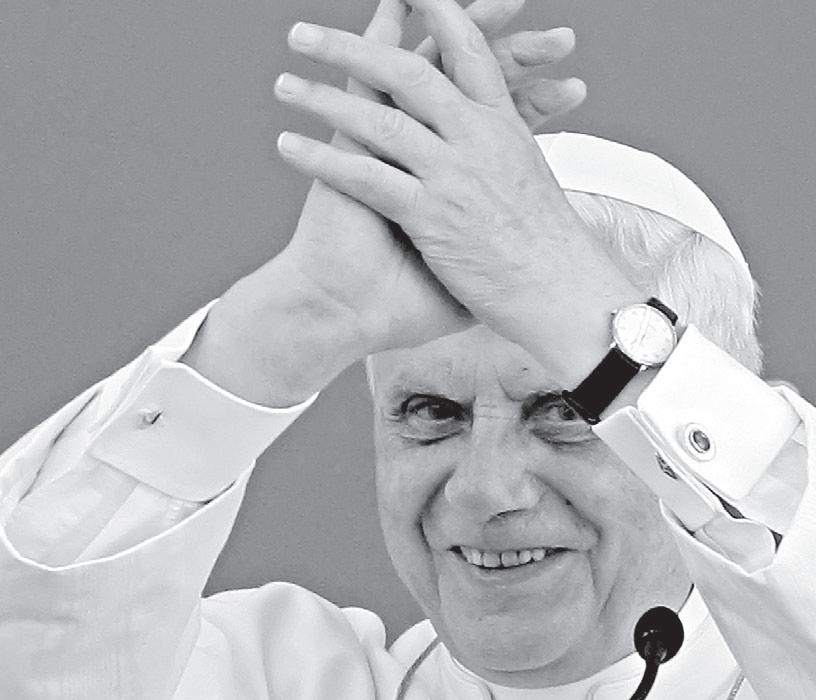
told Catholic News Service. Since 1998, he said, “the most important change has been that we have a new Pope.” In his speech to the movements seven years ago, “he called them to press ahead in a process of maturity,” Carriquiry said.
“The 2006 meeting will be an opportunity to see how that call was followed.”
The movements involved are groups of mainly lay people who have a specific itinerary of prayer and formation and, usually, a particular mission or outreach such as evangelisation, faith education, charitable work or social justice advocacy.
In his 1998 speech, Cardinal
Ratzinger said the movements do not include “initiatives” to promote a specific form of devotion or “pressure groups” aimed at changing church teaching; their “essential criterion” is that of being rooted in the faith and teachings of the universal Church and unwaveringly loyal to the Pope.
Cardinal Ratzinger also spoke at a 1999 meeting of bishops and representatives of the movements to discuss ways to improve the welcome bishops give to the movements and the way the movements show respect for local bishops and priests. When he was archbishop of Munich and Freising, and then prefect of the Congregation for the
Doctrine of the Faith, “everything he has written” about lay movements “indicates very strong support,” Carriquiry said.
In 1978 then-Cardinal Ratzinger gave official recognition to the Catholic Integrated Community, a movement of men and women, single and married, assisted by priests.
The community’s Web site said the movement’s roots go back to 1945 when a small group of Catholic young people in Germany asked themselves why Germany’s Christian majority did not prevent the Holocaust with its murder of 6 million Jews and why Christian citizens did not stop the rise of Nazism in Germany and of communism throughout Eastern Europe.
Members of the Catholic Integrated Community live together and many of them work at community-run schools and health clinics, including one in Rome where the future Pope was said to have been a regular visitor.
Pope Benedict also has close ties with Communion and Liberation, the lay movement founded by Mgr Luigi Giussani in Milan.
Cardinal Ratzinger presided at Mgr Giussani’s funeral in February. Cardinal Tarcisio Bertone of Genoa, the former secretary of the doctrinal congregation who spent time with the Pope in the northern Italian Alps in July, told a reporter that two of the women were even working at the vacation chalet.
“I knew one of them, Cristina, because she had already worked with Cardinal Ratzinger,” he said.
Before becoming Pope, Cardinal Ratzinger urged the movements to
submit to the guidance of local bishops in order to ensure they are not dividing parishes or dioceses. But he also told bishops that they must respect the gifts of the Holy Spirit expressed in the movements and allow themselves to be surprised at what God can accomplish through them.
In his 1998 talk, he said he had “experienced the warmth and enthusiasm” with which the movements lived the Catholic faith and the joy they felt compelled to share with others.
In the 1960s, when traditional forms of Catholic faith and piety seemed to be growing stale, he said, “the Holy Spirit once again asked to speak. And faith began to re-blossom in young men and women - without ‘ifs’ or ‘buts,’ without reservations or easy ways out.” Confidence that the movements were the work of the Holy Spirit, he said, does not mean they are free of human error, such as exclusivity or too narrow a focus.
But, he said, dioceses, parishes and other church structures caring for all Catholics and trying to meet a variety of needs often lack the focus some Catholics want as an aid to living the Gospel in a radical way.
The movements, he said, “are a gift to the entirety of the Church and they must submit themselves to the requirements of this entirety,” while at the same time, a parish priest or local bishop cannot “indulge in any pretence that there be absolute uniformity in the organisations and pastoral programs” operating among his flock. CNS
Archbishop critical of legal stunt Lullaby gift promotes NFP
Parents of newborns to be given gift of lullabies on CD
■ By Joseph Young
A lullaby is a natural way to lull a baby to sleep. Natural family planning is a natural way to achieve, postpone or avoid pregnancy. It would seem natural, then, to combine the two.
The St Cloud Diocese Office of Marriage and Family is creating a compact disc of lullabies that it hopes “to release sometime this fall,” according to Chris Codden, director of the office.
A copy of the CD will be given to expectant couples who take baptismal instruction in all parishes across the diocese. Codden hopes some day to distribute it more widely but right now that would be too costly.
The CD is tentatively titled “Life Is a Miracle: Lullabies for You and Your Baby.”
A major purpose of the CD is to promote natural family planning among couples, Codden said. The liner notes on the CD’s jacket - in addition to listing the contributing musicians’ credits - encourage the use of natural family planning.
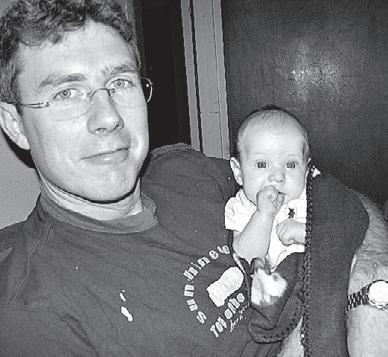
Couples are taught about natural family planning during the diocese’s marriage preparation courses, Codden told the St Cloud Visitor, the diocesan newspaper.
“After childbirth and baptism is an excellent time for couples to think about planning their families naturally. We hope to invite back those who are not using natural family planning, to help them rethink that decision. And we hope to reinforce those couples already using natural family planning,” she said. A recording of lullabies is an appropriate gift for couples who are baptising a child, Codden said.
“Having a baby can be stressful for couples,” she said. “It can affect a family’s priorities, jobs, money and freedom to just pick up and go wherever and whenever they want to.”
More than 3,000 people gathered at the Cathedral of St Mary of the Assumption in San Francisco on August 7 to bid farewell to Archbishop William J. Levada as he prepared to start a new chapter in his life as the highest-ranking US official at the Vatican.
The 68-year-old archbishop, named in May by Pope Benedict XVI as head of the Vatican Congregation for the Doctrine of the Faith, told the crowd at the cathedral that his 10 years as archbishop of San Francisco had been “a significant part of my life as a man, a priest and a bishop.”
He said he measured his success by asking “if in these days I have helped God’s people as their shepherd here in the archdiocese to grow closer to the Lord. ... Only God knows the answer to this question.”
“I firmly believe that what I have experienced in my ministry among God’s people here in the Archdiocese of San Francisco has been a great grace for me, and has enriched me for the new service to the universal Church to which our Holy Father Pope Benedict has called me now,” Archbishop Levada added.
Shortly before the Mass, Archbishop Levada was served with a subpoena ordering him to
Archbishop prepares to leave San Francisco, is served with subpoena
be deposed in relation to clergy sex abuse lawsuits filed by some 250 plaintiffs against the Archdiocese of Portland, Oregon, which the archbishop headed from 1986 to 1995.
Maurice Healy, director of communications and outreach for the San Francisco Archdiocese, confirmed on August 8 that the subpoena had been served in the cathedral sacristy before the Mass, but he criticised the timing of the move.
He said the archbishop, who “walks to work” and is a “very public person,” could have been served with the subpoena on several other, less public occasions.
Healy said remarks made by several plaintiffs’ attorneys in Portland following the Vatican announcement of Archbishop Levada’s new post had convinced him that the lawyers wanted to “seize the opportunity created by his appointment to embarrass the Church.”
The Los Angeles Times reported that Cookie Gambucci, who served the subpoena, said she told the archbishop she would serve it to him on the altar if he did not accept
it before the Mass. Gambucci said Archbishop Levada accepted the subpoena but told her, “This is a disgrace to the Church.”
Healy said the archbishop was misquoted and had said not to Gambucci but to an aide, “This is a disgrace to the legal profession.”
Archbishop John G. Vlazny, current head of the Portland Archdiocese, announced in July 2004 that the archdiocese was filing for bankruptcy protection under Chapter 11 of the US Bankruptcy Code.
Archbishop Levada was scheduled to leave for Rome on August 17, four days after a farewell gala at the Marriott Hotel in downtown San Francisco.
Among those scheduled to attend the gala were representatives of local parishes, members of the clergy, Catholic lay leaders, interfaith religious leaders, civic and community leaders and other guests.
Bishop Wester will serve as apostolic administrator of the San Francisco Archdiocese after Archbishop Levada’s departure until a new archbishop is named.
Page 8 August 11 2005, The Record
CNS
CNS
Pope Benedict XVI greets the crowd during his Angelus address from the papal summer residence at Castel Gandolfo on August 7. PHOTO: CNS
The World
Evolution and God compatible
Vatican astronomer says evolution important for insights into God
The theory of evolution, rather than negating the need for God, helps believers understand that God’s relationship to the universe is that of a nurturing parent, said Jesuit Father George Coyne, director of the Vatican Observatory.
But there is a “nagging fear in the Church” that evolution is incompatible with a divinely planned universe and this fear has historically created “murky waters” in the Church’s relationship to science, he said in an August 6 article in The Tablet, an independent Catholic weekly newspaper published in London.
The article criticised a July 7 article in The New York Times by Austrian Cardinal Christoph Schonborn of Vienna. The cardinal said that an “unplanned process of random variation and natural selection,” both important parts of evolutionary thinking, are incompatible with Catholic belief that there is a divine purpose and design to nature.
In clarifying comments made afterward in Austria and reported by Kathpress, an Austrian Catholic news agency, Cardinal Schonborn said that evolution as a body of scientific fact was compatible with Catholicism, but that evolution as an ideological dogma that denied design and purpose in nature was not.
Father Coyne said that science is “completely neutral” regarding the philosophical and theological implications of its findings, but this does not prevent believers from using the best scientific data available to improve their understanding of God.
Evolution is not only compatible with Catholicism but also “reveals a God who made a universe that has within it a certain dynamism and thus participates in the very creativity of God,” said Father Coyne.
“God is working with the universe. The universe has a certain vitality of its own like

a child does,” he said. God “is not constantly intervening, but rather allows, participates, loves,” he said. Based on the results of modern science and modern biblical scholarship, “religious believers must move away from the notion of a dictator or designer God, a Newtonian God who made the universe as a watch that ticks along regularly,” he said.
“Perhaps God should be seen more as a parent or as one who speaks encouraging and sustaining words,” he said.
This view is compatible with the Bible, which gives God human characteristics and presents divinity as “a God who gets angry, who disciplines, a God who nurtures the universe, who empties himself in Christ the
incarnate word,” he added. Father Coyne criticised Cardinal Schonborn for saying that the scientific processes of “chance” and “necessity” cannot explain the presence of purpose and design in nature. He gave the example of two hydrogen atoms meeting in the universe.
“By necessity (the laws of chemical combination) they are destined to become a hydrogen molecule. But by chance the temperature and pressure conditions at that moment are not correct for them to combine,” he added.
“And so they wander through the universe until they finally combine,” he said.
“By the interaction of chance and necessity, many hydrogen molecules are formed and eventually many of them combine with oxygen to make water, and so on, until we have very complex molecules and eventually the most complicated organism that science knows: the human brain,” he said.
“Chance” and “necessity” are continuously interacting and must be understood as being tied to the scientific process of “fertility” by which the universe is constantly generating matter, he said.
“The classical question as to whether the human being came about by chance, and so has no need of God, or by necessity, and so through the action of a designer God, is no longer valid,” he said.
“The meaning of chance and necessity must be seen in the light of that fertility,” he said. The universe contains trillions of stars and they “release to the universe the chemical abundance of the elements necessary for life,” he said. “There is no other way, for instance, to have the abundance of carbon necessary to make a toenail than through the thermonuclear processes in stars. We are all literally born of stardust,” he said.
Evolution is a continuous process and “has a certain intrinsic natural directionality in that the more complex an organism becomes the more determined is its future,” he said.
God should be truly adored by all
Adoring God means recognising his presence as creator and lord of the universe and ensuring that God is the most important part of one’s life, Pope Benedict XVI said. With about 2,000 people packed into the courtyard of his summer villa south of Rome and several thousand more people gathered in the square outside the villa on August 7, the Pope focused his address on the upcoming celebration of World Youth Day. The theme of the August 16-21 celebration in Cologne, Germany, is: “We Have Come to Worship Him.”
Pope Benedict said an attitude of worship and adoration is the attitude that has marked the lives of saints throughout Christian history. It involves recognising the greatness of God and the gift of salvation in Jesus with gratitude that “arises from the depths of one’s heart and marks one’s whole being,” he said. During the Cologne gathering, the Pope said, the Church wants to help young people reach the “peak of love,” showing them that in dedicating their lives completely to God they will discover the purpose of their existence.
The Vatican announced that Catholics participating in World Youth Day events can receive a plenary indulgence if they attend any of the events or the closing Mass with prayerful devotion, receive the sacraments of reconciliation and the Eucharist and offer prayers for the intentions of the Pope. “Other faithful, wherever they are during the encounter, will receive a partial indulgence if, with a contrite spirit, they ask with fervent prayers that God strengthen young Christians in their profession of the faith, that he confirm them in love and in respect for their parents” and that he help them form holy Christian families or follow a vocation to the priesthood or religious life, the Vatican statement said.
Sisters defend their care of special needs children
The Missionaries of Charity denied allegations that they abused residents at a home for children in India. Their denial follows reports that British television reporter Donal MacIntyre, posing as a volunteer, secretly filmed children being tied to cots at the nuns’ “Daya Dan,” or Gift of Mercy, home for children in Calcutta, reported UCA News, an Asian church news agency based in Thailand.
MacIntyre allegedly found children with their hands tied during
the world in brief
Pope visits ill brother
mealtimes and tied at night to their cots with pieces of cloth. The children reportedly are ages six months to 12 years.
Sister Paula Marie, superior of the home, told UCA News that the allegations come from people who look at the situation “very much from the outside, not understanding the relationship” between the children and their caregivers. “We don’t abuse children,” she said. “What we do is for the good of the child, for training or safety, and the use of
Pope Benedict’s older brother, Mgr Georg Ratzinger, was released from Rome’s Gemelli hospital on August 6, three days after receiving a pacemaker and the morning after a visit from his brother. Mgr Ratzinger, 81, was taken to the hospital on August 3 with an irregular heartbeat.
He had been staying with the Pope at the papal summer villa in Castel Gandolfo, south of Rome. Doctors inserted the pacemaker that same evening. Pope Benedict left Castel Gandolfo in an Italian air force helicopter at 5pm on August 5 and landed at the hospital helipad about 15 minutes later. Alerted by the erection of security
restrictions has been limited.” She said that nuns had to restrain some disabled children for limited periods “so they do not harm themselves.” She also said children with special needs are sometimes tied when they are spoon-fed to keep them from waving their hands.
In a statement, Britain’s Five News said it began investigating the home after hearing complaints from international aid workers, reported Reuters, a British news agency.
The Missionaries of Charity, in
barricades and an increased police presence, about 50 patients and their visitors, as well as journalists and photographers, were on hand when the Pope entered the hospital. Pope Benedict spent about 20 minutes upstairs with his brother.
Catholics killed
Two Catholic men were among those killed when an Israeli soldier absent without leave opened fire on a crowded bus in the northern Israeli Arab village of Shfaram on August 4. Michel Bahhus, 56, the bus driver, and Nader Hayyak, 56, a passenger, were both members of the Melkite church in the village.
“We were all in shock after the shooting,” said Melkite Father Nadim Shakkour
a July 30 statement released from its motherhouse in Calcutta, said, “Physical restraints are used only when absolutely necessary for the safety of the child and for educational purposes for limited periods of time. We value constructive criticism and admit that there is always room for improvement,” the statement said. However, the congregation said that only those who work “day in and day out” with the “59 very special children” in the home can “really know both the demands
in a telephone interview, his voice hoarse after spending the night consoling the families of the murdered men. “We couldn’t believe something like this could happen in Shfaram.
Life was calm in Shfaram until that villain put an end to the calm, but we will overcome this,” he said. Bahhus’ niece was to be married on August 6, Father Shakkour said; the celebration has been canceled. Two Muslim sisters, Dina, 21, and Hazar Turki, 23, also were killed in the attack.
Take Gospel to the public
The Church must take the Gospel message into the public sphere in order to “attain the common good” and bring about “a civilisation of love,” Pope Benedict XVI
to total self-forgetfulness as well as the joy at the (slightest) response and improvement in these children.”
Father C.M. Paul, a Salesian linked to the congregation for three decades, finds such children being tied “nothing to be perturbed about.” The Indian situation does “not fit requirements of normal practice in the West,” he told UCA News in an e-mail. “Only people with heart and who work for such children” understand what methods must be used to feed the children, he said.
said in a letter to Spanish bishops. “The true nature and mission” of the Church involves “promoting the common good for all people,” and, as such, “spreading the faith and religious practice cannot be confined to the purely private sphere,” he said in a written message released by the Vatican on May 23.
Christ came not “to judge the world,” but that the world would be saved by him, the Pope said in the letter, read on May 21 to thousands of pilgrims at the start of a pilgrimage to the sanctuary of Our Lady of Pilar in Zaragoza.
Fifty-one Spanish bishops and the apostolic nuncio to Spain, Archbishop Manuel Monteiro de Castro, were to take part in the pilgrimage as part of the Year of the Eucharist and Spain’s Year of Immaculate Mary.
August 11 2005, The Record Page 9
CNS
CNS
Father George Coyne, director of the Vatican Observatory.
Reviews
Evangelisation - witnessing to God’s love
Constants in Context:
A Theology of Mission for Today
Written by Stephen B. Bevans SVD
with Roger P. Schroeder SVD
Published by Orbis Books, New York
US$30
■ Review by Father John Thornhill SM
This year marks the 30th anniversary of Paul VI’s Apostolic Exhortation on Evangelisation, Evangelii Nuntiandi – acclaimed as one the greatest papal documents of the 20th century. Catholic Mission, with the Catholic bishops of Australia, is organising conferences on evangelisation in the nation’s capital cities to honour this anniversary.
The keynote speaker at these conferences will be American theologian, Stephen Bevans SVD, an authority on evangelisation. His recently published book Constants in Context: A Theology for Mission Today gives us a foretaste of what we may look forward to. Though he writes in a clear, readable style, it is amazing how much he has included in this book, as he reviews the Church’s experience of evangelisation down through the ages.
His survey reminds us that, in recent centuries, the Catholic Church and the Protestant movement have had different approaches to the spreading of the gospel. From the time of the Reformation, Protestants have had a strong emphasis upon the gospel message of salvation through faith in the Saviour. The Catholic tradition, though it has taken the Christian faith throughout the world, has tended to take the gospel message for granted. Today, however, the Church is being called to a ‘new evangelisation’ – a renewed appreciation of the life-giving power of the Good News brought by Christ, and a renewed awareness of our responsibility to share this Good News with the world of our time.
The Good News brought by the Saviour tells us what our God is really like. As one theologian quoted by Bevans puts it, those who have heard the message of the gospel “discover a God that contrasts sharply with the God of punishment and passive resignation” too many good Christians have taken for granted. God’s Word became flesh, Bevans reminds us, to give expres-
Saturday August 13-15
sion in our world to “God’s unimaginable, unbounded love – through his words, deeds and personal witness”. A lively faith in this truth will lead inevitably to a deeper acceptance of “the centrality and truth of Jesus Christ”, and to a deeper personal relationship with the Saviour.
Our author reminds us of the fact that ‘Evangelical and Pentecostal churches are growing most rapidly today’ throughout the world. There can be little doubt that these groups owe much of their appeal to the fact that they present the gospel message as an invitation to enter into a personal relationship with the Saviour and his eternal Father. The highly institutionalised style of life of the Catholic Church in recent times has tended to work against an appreciation of the faith as an invitation to enter into a trusting personal relationship with God. The ‘new evangelisation’ must help our good people to find the joy of knowing that, from all eternity, they have been the object of God’s love, and that their “eternal destiny is part of God’s mysterious and merciful plan” – as John Paul II put it in his encyclical on the Church’s mission of evangelisation.
As it has often been said, the Catholic Church, with all its magnificent resources, is a sleeping giant unaware of its immense potential for good. St John Chrysostom told the people in Constantinople in the 4th century: “If we were all true Christians, there would be no unbelievers left in our city”. In our own time, Paul VI has stressed the place of genuine communication in our outreach to the unchurched. As Bevans points out, Paul VI returned to this theme in a memorable paragraph of Evangelii Nuntiandi: “The outstanding means of spreading the Christian gospel is the witness of an authentic Christian life … Today, people listen more willingly to witnesses than to teachers, and if they listen to teachers it is because they are witnesses” (n.41).
The ‘witness’ the Pope speaks of is a message that resonates with a goodness associated with deep conviction. We have all experienced the effectiveness of such ‘witness’. As Bevans observes, “the gospel is most often transmitted, not by ‘official’ missionaries, but by its own power, and by ordinary men and women of faith”.
The witness of the Church, our author points out, is given in three forms: through personal contact, through the shared life
of Church communities, and through the Church’s institutional initiatives. In recent times, we Catholics have been most aware of the Church’s institutional witness. We need a greater recognition of the importance of the other two forms. The examples Bevans lists, of witness at the personal level, remind us of its immense potential: the witness of “a person of prayer, a faithful spouse, a patient and loving parent”, the witness given by a professional life characterised by Christian generosity and ethical integrity. As Bevans puts it, “faith-inspired lives bring life wherever they are”.
“See how these Christians love one another” – the witness of the shared life of the early Christian communities converted the ancient world. A rediscovery of the potential of community witness can bring a new force for good into the life of today’s Church. When Christian communities welcome those outside their membership to join them in worship – for a wedding, a funeral, of even for ceremonies specially arranged as a welcome for the unchurched – these outsiders are often very deeply touched as they gain a new understanding of what the Church has to offer. The potential of such moments will be directly related, of course, to the climate of friendship that already unites the welcoming community.
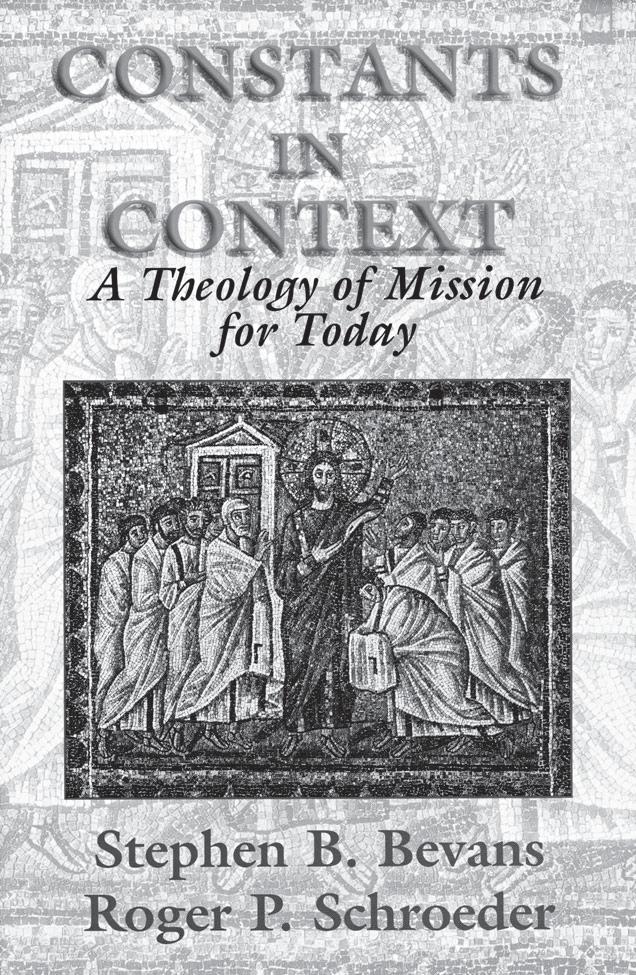
Among the many activities of shared Catholic life, the liturgy should have a central place as a moment of community witness – a liturgy presided over by a minister alive to the great mystery being celebrated and bonded in charity to his people in their current joys and sorrows; a liturgy in which the Word of God is read with the reverence and wonder brought by a lively faith, a liturgy in which a parish community comes together to strengthen their common life in Christ.
Reading Stephen Bevans’ book leaves one with a profound sense of hope and
optimism. The Church faces the call to the ‘new evangelisation’ with immense resources. It is the Spirit of God that unites us from our many backgrounds in God’s one Church. The message we bring to the world has been lived out in our own flesh and blood by the Father’s eternal Son. It is the message of God’s ways, of the life, justice and peace the world longs for. The bottom line, however, as Bevans reminds us, is that the mission we are called to is God’s own mission – “As the Father sent me, so am I sending you” (Jn 20:21).
Father John Thornhill is a Marist Father with an international reputation as a theologian. He was appointed by Pope John Paul II to the Church’s International Theological Commission; and he has been a member of ARCIC, the official dialogue between the Catholic and Anglican Churches. At present he is ministering in Thornlie parish, where he has collaborated with Father Patrick Lim in producing The Emmaus Series, audio-visual presentations of 20 themes of a renewed Christian faith.
PANORAMA a roundup of events in the archdiocese
CELEBRATE THE 17TH ANNIVERSARY OF PERPETUAL
EUCHARISTIC ADDORATION AND THE YEAR OF THE
EUCHARIST, ST GERARD’S MIRRABOOKA
Saturday August 13 at 2pm the White House Video
Afternoon viewing The Power of His Presence and The Eucharist. Sunday 14 August at 3pm in the Church Holy Hour followed by a shared cuppa. Please also bring a something to share. Monday August 15 Feast of the Assumption after the 9am Mass there will be a procession and Rosary to the Grotto.
Sunday August 14
THE ASSUMPTION OF THE BLESSED VIRGIN MARY
Will be celebrated at the Shrine of the Virgin of Revelation, 36 Chittering Rd, Bullsbrook at 2pm, with Marian Procession, Holy Mass, and Benediction of The Blessed Sacrament. The Sacrament of the sick will be administered during Mass. All are most welcome. Enq SACRI 9447 3292.
Sunday August 14
ETERNAL WORD TELEVISION NETWORK
1 2 PM ON ACCESS 31
The Church in Europe / George Weigel with Raymond Arroyo The World Over. A crisis in Faith
exists, not only in Europe, but elsewhere, including Australia! Anti-religious propaganda is rampant in some sections of the secular media. EWTN is a wonderful antidote, which has been responsible for numerous conversions worldwide. Free-to-air broadcast is available around the clock by simply having a satellite dish installed. The gift of Faith is priceless, and families are in danger. For information please ring 9330 1170. Postal address: The Rosary Christian Tutorial Association, PO Box 1270, Booragoon 6954.
Sunday August 14
PILGRIMAGE TO YORK IN HONOUR OF ST PHILOMENA
Bus to York, Holy Mass in the Historic Parish Church of St Patrick at 12pm with Benediction, Litanies, Rosaries and other devotions in honour of St Philomena. Bus leaving Mercedes College staff car park off Goderich St, Perth opposite Jewel House. Cars may be parked in the car park, which will be locked on departure at 10.15am and opened upon return at 6.30pm. BYO lunch. All welcome Enq Fr Michael Rowe for bookings 9444 9604
Sunday August 14
FATIMA HOLY HOUR
The World Apostolate of Fatima will hold a Holy
Hour in Our Lady of Lourdes, Flinders St, Nollamara at 3pm. In this special year of the Eucharist, let us spend an hour in the company of Mary, to make Eucharistic reparation to her Divine Son. All welcome Enq 9339 2614.
Sunday August 15
SUNG LATIN MASSFEAST OF THE ASSUMPTION OF THE BLESSED VIRGIN MARY Low Masses at 7.30am, 1.10pm and Sung Mass at 6.30pm. Exposition of the Blessed Sacrament to take place in St John’s Pro Cathedral after the 1.10pm Low Mass till before the evening Sung Mass at 6.30pm. St John’s Pro Cathedral, Victoria Ave Perth.
Tuesday August 16
INNER PEACE
Presenter: Murray Graham (Inigo Centre Director)
Multi-Purpose Room John XXIII College 7.30-9.30pm
Cost: Donation for Inigo Centre. Details: Murray 9383 0444.
Wednesday August 17
PREGNANCY ASSISTANCE INFORMATION DAY
Are you Pro Life? Compassionate? A Good Listener?
If you would like to find out how you can use your
gifts at Pregnancy Assistance, we invite you to an Information and Training Day. To Register Ph 9328 2929.
Saturday August 20
MEETING JESUS IN JOHN’S GOSPEL
A Saturday Morning Retreat. Presenter Fr John Prendiville (S.J) (Jesuit Priest). Multi-Purpose Room John XXIII College 9.30am-12pm. Cost: Donation for Inigo Centre.
Monday August 15-21
BILLINGS WA
Natural Family Planning Week. Manage your fertility naturally. Accredited teachers in all areas. Confidential Appointments. Contact Perth (08) 9399 4394, Bunbury (08) 9791 3696. Free call State Wide 1800 819 841.
Friday August 19-21
HOW DO I KNOW THAT GOD IS CALLING ME TOO Join a group of other young people for a weekend of prayer, listening to other people’s stories and learning tools to help you determine where God is leading you in terms of your state of life, career or any other part of your journey which may be unclear. Run by the WA vocations network, the
Page 10 August 11 2005, The Record
BOOK KEEPING
■ SMALL BUSINESS BOOKKEEPING MYOB
Bulk rates negotiable. Ph: Margaret 9459 5866/0403 778 426
BUILDING TRADES
■ BRICK REPOINTING
Phone Nigel 9242 2952.
■ GUTTERS/DOWNPIPES
Need renewing, best work and cheapest prices. Free quote. Ph: Ad 9447 7475 or 0408 955 991 5008.
■ PERROTT PAINTING PTY LTD
For all your residential, commercial painting requirements. Phone Tom Perrott 9444 1200.
■ PICASSO PAINTING
Top service. Phone 9345 0557, fax 9345 0505.
CATHOLICS CORNER
■ RETAILER OF CATHOLIC PRODUCTS
Specialising in gifts, cards and apparel for baptism, communion and confirmation. Ph: 9456 1777. Shop 12, 64-66 Bannister Road, Canning Vale. Open Mon-Sat.
CHANGE YOUR LIFE FOREVER
■ WORK FROM HOME
Around your children & family commitments. My business is expanding and I need people to open new areas all over Australia. Training given. Highly lucrative. www.cyber-success-4u.org
COUNSELLING
■ ADVANCED DIPLOMA OF COUNSELLING
Personal and Family Counselling. Advanced diploma of educational counselling in personal and spiritual awareness and relationship education. Ausstudy-accredited. Ph Eva 9336 3330.
FOR SALE
■ VESTMENTS
The Sister’s of the Carmelite Monastery have a few sets of vestment s for SALE. If interested please ring 9795 7807.
FURNITURE REMOVAL
■ AAA SLIPSTREAM
Piano removal, sales and hire. Special discount for schools. Contact Tony 0418 923 414
■ ALL AREAS Mike Murphy 0416 226 434.
HEALTH
■ NEURO PSYCHOLOGICAL IMMUNITY
For women who are suffering from cancer or are in remission. Hennie is a qualified practioner and uses a combination of relaxation, medication, visualisation, and pain control techniques to improve health and can speed up the healing process by re-activating the immune system. These techniques are to be used in conjunction with your physician or specialist. Gold coin donation is appreciated. Light refreshments are provided. Hennie has a diploma in the Science of Neuro-Psychological Immunity. tel: 95250292.
HOLIDAY ACCOMMODATION
■ BUSSELTON
Geog Bay, Park Home sleeps UP TO 6 winter rates apply. Ph Elizabeth 0408 959 671.
■ DENMARK
Holiday House 3bdr x 2bth, sleeps up to 8. BOOK NOW. Ph: Maria 0412 083 377
Retreat will be held at the St Joseph’s retreat house. Please contact Bronia for more information on 0407 430 478 or 9478 1263 or bkarnie@hotmail.com.
Sunday August 21
FESTA BRUNSWICK JUNCTION
You are invited to the Our Lady’s Assumption Parish, Brunswick Junction Festa, Sunday 21 August 2005. Mass 10.30am in the Brunswick Town Hall. Rosary Procession starts at 2pm and concludes with Benediction. BYO Lunch, Tea & coffee will be provided Enquiries : Ross Princi 9726 1077, Domenic Frisina 9726 1283.
Monday August 29
CARITAS AUSTRALIA INVITES YOU TO THEIR 2005 ANNUAL
GATHERING
Registration 6.45pm 40A Mary St, Highgate (entry off Harold St) National Director, Jack de Groot; Global Education Advisor, Janeen Murphy on What Caritas is doing now including ‘Make Poverty History.’ Bookings by Thurs 25 Aug Ph 9422 7925 Email perth@caritas.org.au.
Saturday September 3
DAY WITH MARY
Our Lady’s Assumption Church, Cnr Stevenson and Creery Street, Mandurah, from 9am-5pm. A video on Fatima will be shown followed by a day of prayer and instruction based upon the message of Fatima. The day also includes the Sacrament of Penance, Holy Mass, Eucharistic Adoration, Sermons, Rosaries, Procession of the Blessed Sacrament and Stations of the Cross. Please BYO. Enq 9250 8286. Transport is $14. Bookings 9367 1366 or 0404 893 877.
CROSS ROADS COMMUNITY TERM 3
JULY 19 SEPTEMBER 23
Family & Friends Support Groups of Substance
Abusers are on Wednesdays 7-9pm, Substance Abusers Support Groups are on Tuesdays 5.307.30pm & Fridays All day Group for Substance
Abusers is from 9.30am to 2pm including Healing Mass on Fridays at 12.30pm during term. Rosary is from Tuesday to Thursday at 12.30-1pm.
RESOURCE CENTRE FOR PERSONAL DEVELOPMENT
PROGRAMS FREMANTLE
195 High St Personal and spiritual awareness and relationship education course starting in August. Bible study and Charismatic Prayer Meeting every Tuesday. Enq 9336 3330.
HOUSESITTER
■ AVAILABLE 2006
Currently taking bookings to care for your home and pets. Metro area. Natalie Tel. 0417 976 028
IN MERMORIUM
■ KIRKWOOD ARTHUR
In prayerful memory of my dear Father, who died on August 11, 1991. Fourteen years have passed, but the sadness remains, O my Pappa! May you remain ever in the keeping of Almighty God, and Darling wonderful Mother also. I miss you both so much, and you are always lovingly in my heart and prayers. Moira Eternal Rest grant unto them, O Lord, May Perpetual Light shine upon them, May they Rest in Peace.
MUMS ON A MISSION
■ SUCCEED FROM HOME Call Christine on Tel: 9256 2895.
OPEN DAY
■ YOUTH WITH A MISSION
Check out training and ministry opportunities... enjoy music, fun and games... feast on a free sausage sizzle... Youth With A mission has existed in Perth for over 20 years equipping young and old alike with the knowledge and methods to impact this city and nations abroad by helping those in need. Please join us for this great event and learn more about our training programs as well as opportunities for you to become involved.
Date: 29th October 2005... time: 10am4pm... location: 150 Claisebrook Road, Perth... contact: (08) 9328 5321... hope to see you there.
RELIGIOUS PRODUCTS
■ CLASSIC ROMAN/GOTHIC VESTMENTS
Entire Sacristy spectrum. Catholic banners, Copes, Dalmatics, Antipendiums, linen Altar Cloths, Altar Covers, Mass Linens, Albs, surplices, Processional Canopies, Cassocks, etc. 20 years experience in the field. www.susanmaria.com Email: susan@susanmaria.
com Ph: (08) 9271 0288, 13/7 Falkirk Avenue, Maylands, WA. Please phone ahead.
THANKS
■ ST CLARE
Thank you Saint Clare for hearing my prayer. P.M.
TO LET
■ TO SHARE WITH ELDERLY COUPLE
Mature couple seeks mature woman, 35 years plus, non-smoker, non-drinker and Christian values a must. Full accommodation (breakfast, lunch and dinner free) and some financial recompense for assistance with care for the lady of the house. This is not a full-time carer’s position. Ph: 9490 0271
WANTED
■ CLEANER
Looking for a trutsworthy, committed cleaner to do two houses in the Stirling + Duncraig areas. Day-Saturday, but can be negotiated. Please call Joan between 12.30 - 1pm Mon-Fri 9444 9366 or after 7pm 9344 3380.
Classifieds Phone Eugene 9227 7080 or A/h: 9227 7778
BLESSED SACRAMENT ADORATION
Every Sunday
BULLSBROOK SHRINE MASS PROGRAM
Shrine of Virgin of the Revelation 36 Chittering Rd. Bullsbrook 2pm Holy Mass, Exposition of the Blessed Sacrament and Holy Rosary. Reconciliation is available in Italian and English before every celebration. A Monthly Pilgrimage is held on the last Sunday of the month in honour of the Virgin of the Revelation. Anointing of the sick is administered for spiritual and physical healing during Holy Mass every second Sunday of the month. The side entrance to the Church is open daily between 9am and 5pm for private prayer. For all enq SACRI 9447 3292.
ALL SAINTS CHAPEL
CONFESSIONS: 10.30 to 11.45am and two lunchtime
MASSES: 12.10 and 1.10pm Monday through Friday. Easy to find in the heart of Perth , 77 ALLENDALE
SQUARE, St. George’s Terrace, Perth, WA. Let the peace of the Chapel surround you; let the hurry and worry of your many cares be left with the Lord. Visit with Him. Talk with Him. Give yourself time for Him! Exposition: 8am - 4pm. Morning Prayer: 8am (Liturgical hours). The Holy Rosary daily: 12.40pm.
Divine Mercy Prayers and Benediction: Mondays and Fridays 1.35pm. St. Pio of Pietrelcina Novena to the Sacred Heart and Benediction: Wednesdays 1.35pm. To help you know and appreciate your Faith, a Lending Library of a thousand books, videos, cassettes at your service. Tel: 9325 2009. The Chapel is closed weekends and public holidays. www.allsaintschapel.com
PERPETUAL ADORATION
Of the Blessed Sacrament Christ the King, Lefroy Rd, Beaconsfield. Enq Joe Migro 9430 7937, A/H 0419 403 100. Adoration also at Sacred Heart, 64 Mary St Highgate, St Anne’s, 77 Hehir St Belmont. Bassendean, 19 Hamilton St and Mirrabooka, 37 Changton Wy. “Jesus is there for you 24/7.”
40 DAYS OF PURPOSE
An August-September all-Christian Evangelisation course being conducted in many Perth churches and communities. More info: Harry (9444 4626) and Website: www.purposedriven.com.au.
ASSISTANCE REQUIRED
The Catholic Parish of St Anne’s, Bindoon require help to assist tradesmen to complete work on the Parish centre. Ph John 9457 7771.
Holy Family Church, Alcock Street, Maddington. Every Friday 8.30 am Holy Mass followed by Blessed Sacrament Adoration till 12 noon. Every first Friday of the month, anointing of the sick during Mass. Enq. 9398 6350.
REFLECTION AFTERNOONS
Challenge of Living as a Eucharistic Community in the Modern World. For everyone involved in Eucharistic Ministries or Service. Speakers include Archbishop Hickey. Topics: Challenge of Change, 21 August, Redemptorist Monastery, 2-4 pm. Phone 9422 7902.
SUNDAY CHINESE MASS
The Perth Chinese Catholic Community invite you to join in at St Brigid’s Church, 211 Aberdeen St (Cnr of Aberdeen and Fitzgerald) Northbridge. Celebrant Rev Fr Dominic Su SDS. Mass starts 4.30pm every Sunday. Enq Augustine 9310 4532, Mr Lee 9310 9197, Peter 9310 1789.
LITURGY OFFICE OFFERING EXCELLENT WORKSHOPS
Leadership for Music Ministry, 25 August. Cantors for the Country: To give people confidence and practical skills to lead the singing in country parishes 13 August and 22 October. Phone: 9422 7902.
CONFRATERNITY OF THE HOLY SPIRIT
The Confraternity of the Holy Spirit has been sanctioned in the Perth Archdiocese, our aim is to make the Holy Spirit known and loved, and to develop awareness of His presence in our lives. If you would like more information please call WA Coordinator Frank Pimm on 9304 5190.
CATHOLICS EXPERIENCING THE BIBLE
PARTTIME COURSES
An exciting opportunity to learn more about your faith. Enrolments are now open for study at Acts 2 College of Mission and Evangelisation in term 3.
Short Course: Mary in the Mystery of the Church - Fr Leo M Spicer, OSM on Mon 15th and Mon 22nd August commencing 9am. Registration and enquiries to Jane on 9202 6859 or 0401 692 690.
CATHOLICS EXPERIENCING THE BIBLE
PUBLIC LECTURES
An exciting opportunity to learn more about your faith. Public lectures Tues 4 - 5pm. August 2-30: The Catechism (Fr Hugh Thomas); Sept 6: Praying with
OFFICIAL DIARY
AUGUST
13 Mass for Marian Movement of Priests’ Retreat, Sacred Heart College - Archbishop Hickey
14 Mass at Dianella ParishArchbishop Hickey Confirmation, Santa Maria College - Archbishop Hickey
15 Reception commemorating 60th Anniverary of Victory in the Pacific with veterans of World War II, Perth - Fr Jim Petry MBE
16 Visit of Greek Students from Rizarios - Archbishop Hickey Official Opening of Angelico Art Exhibition, Perth - Archbishop Hickey
17 Opening and blessing of Newman College Buildings - Archbishop Hickey
19-21 Parish Visitation and Confirmation, Armadale - Archbishop Hickey
21 Confirmation, Aquinas College - Bishop Quinn
22 Mass for Missionaries of Charity - Archbishop Hickey
23 Northbridge History ProjectArchbishop Hickey
24 Opening and blessing of renovations at St John of God Hospital, Murdoch - Archbishop Hickey
25 Presentation of Youth Book to Yr 12s at Iona Presentation College - Archbishop Hickey Bishop Don Sproxton will be on a pilgrimage for World Youth Day during the month of August.
Mary (Fr Chris M Ross, OSM); Sept 13: Praying with Scripture (Fr Anthony Van Dyke, OP); and Sept 20: Praying through the heart of Jesus (Fr Jim Shelton). Cost $5 per lecture. Enquiries to Jane on 9202 6859 or 0401 692 690.
First Sunday of each month
DEVOTIONS IN HONOUR OF THE DIVINE MERCY
Fr Douglas Hoare and the Santa Clara Parish Community welcome anyone from surrounding Parishes and beyond to the Santa Clara Church cnr of Coolgardie and Pollock Streets, Bentley. The afternoon commences with the 3 o’clock prayer, followed by the Divine Mercy Chaplet, Reflection, and concludes with Benediction.
THE DIVINE MERCY APOSTOLATE
St Mary’s Cathedral, Victoria Square, Perth – each first Sunday of the month from 1.30pm to 3.15pm with a different priest each month. All Saints Chapel, Allendale Square, 77 St George’s Tce, Perth - each Monday and Friday at 1.35pm. Main Celebrant Fr James Shelton. St Francis Xavier Church, 25 Windsor Street, East Perth - each Saturday from 2.30pm to 3.30pm, main celebrant Fr Marcellinus Meilak, OFM. Saints John and Paul Church, Pinetree Gully Drive, Willeton - each Wednesday from 4pm to 5pm. All Enq John 9457 7771.
Please Note
The Record reserves the right to decline or modify any advertisment it considers improper or not in unison with the general display of the paper.
August 11 2005, The Record Page 11 Classifieds Classified ads: $3.30 per line incl. GST 24 hour Hotline 9227 7778 Deadline: 5pm Tuesday ADVERTISEMENTS
The Last Word
The miracle at Gona
Continued from Page 1
used it as the ciborium to contain the hosts. In those days, the priest celebrated Mass with his back to the congregation.
“He turned to give the absolution before Communion and noticed all too late that the number of soldiers assembled seemed to have grown considerably.
“He said to himself, “Well, they probably won’t want to receive Communion’.
“He began to distribute the consecrated hosts, but the line of men coming to Communion seemed endless. He thought he had better start breaking the hosts, but he did this just a few times before realising that he still would not have enough hosts and, strangely, the supply of hosts had not seemed to lessen, so he continued to give every man who approached the full host.
“The men continued coming. Not just Catholics, but members of other denominations and maybe none. The hosts continued to multiply. He
avowed later on that he would have distributed Communion to more than 450 men.
“When the line of soldiers came to an end, he found that he still had three hosts in the chalice. What was the significance of these?
“He looked around and, out of the corner of his eye, he saw three men, overcoming their diffidence, making their way from the perimeter of the crowd.
“They were the last. ‘Corpus Domini Nostri Jesu Christi, custodiat animam tuam in vitam aeternam. Amen.’ They received the last three hosts.
“He finished the Mass with great emotion, for clearly God had intervened to give each of these men the consolation of His presence in the Eucharist. They felt their need of Him and He would not deny them.
“The chalice was used after WW2 in the Mass kit in Albany when Mass was said at the outstations, like Lower Kalgan and Mount Manypeaks. It was finally entrusted to Terry Flanagan who
in turn donated it, in accordance with the Padre’s wishes, to the 2/16th Battalion with whom he served.
Fr Fitzsimons told The Record that another Mass kit used by Padre Cunningham during WW2 was in the Canberra War Memorial museum.
Fr Cunningham was born at Glen Forest on October 23, 1904 and was educated at SIC, New Norcia before training for the priesthood. He joined the Army as a chaplain on January 3, 1941, serving first the Melville camp, and then the hospital ship Wanganella before arriving in New Guinea where he accompanied the troops to various locations. He became Senior Chaplain 7 Australian Division on June 8, 1944. Among his many experiences, he took the Japanese surrender on one island because he was the senior officer there at the time.
On his return to WA, he served in various places, but is particularly remembered as parish priest at Dardanup in the 1950s and later at Albany.
Four Books for Young People and Children
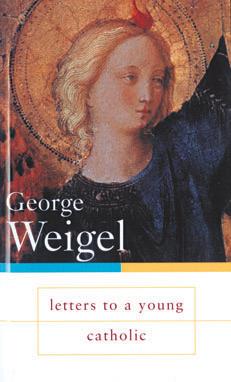

LETTERS TO A YOUNG CATHOLIC
By George Weigel
$25.00
Catholicism is a “habit of mind.” So Weigel takes us on an extraordinary journey to the building blocks of the Catholic faith: from Chartres Cathedral to G.K. Chesterton’s favourite pub, from the grave of a modern martyr in Warsaw to the Sistine Chapel. Letters to a Young Catholic will inspire not only this generation of Catholics but also the faithful, the doubtful and the searchers of every age.
COME TO ME, MY CHILDREN
A Book of Prayers
$25.00
A gem of great value for children and for parents who are concerned for their children and the secular impact of modern society. The book which has the imprimatur of Cardinal George Pell is printed in large clear type easily read by children and cleverly illustrated by Carlos Barrios, designed to capture the imagination of children.
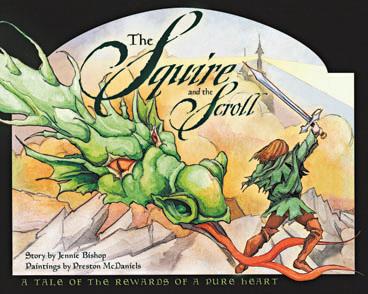
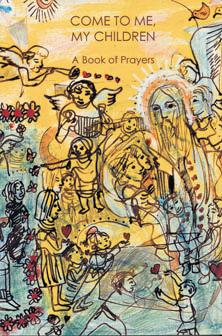


THE PRINCESS AND THE KISS & THE SQUIRE AND THE SCROLL
By Jennie Bishop




$20.00 each
Beautifully illustrated in classic fairy-tale style, Bishop’s storybooks offer “his and hers” lessons on the timeless virtues of purity and courage. In her newest, The Squire and the Scroll, a brave young lad fearlessly defends “the lantern of purest light” against all enemies - including a fire-breathing dragon!


MReason Six
arriage seems to be a wealth creating institution. Married couples build more wealth on average than do otherwise similar singles or cohabiting couples, even after controlling for income. The economic advantages of marriage stem from more than just access to two incomes. Marriage partners appear to build more wealth for some of the same reasons that partnerships in general are economically efficient, including economies for scale and specialisation and exchange. Marital social norms that encourage healthy, productive behaviour and wealth accumulation (such as buying a home) also appear to play a role. Married parents also more often recieve wealth transfers from both sets of grandparents than do cohabiting couples; single mothers almost never recieve financial help from fathers’ kin. A survey conducted by the Australian National University found that an unmarried person needs to earn $70,000 a year to be as happy as a married person on a family income of $20,000 a year. The survey also noted that money “is a less important ingredient of a satisfying life than marrieage and church going.”
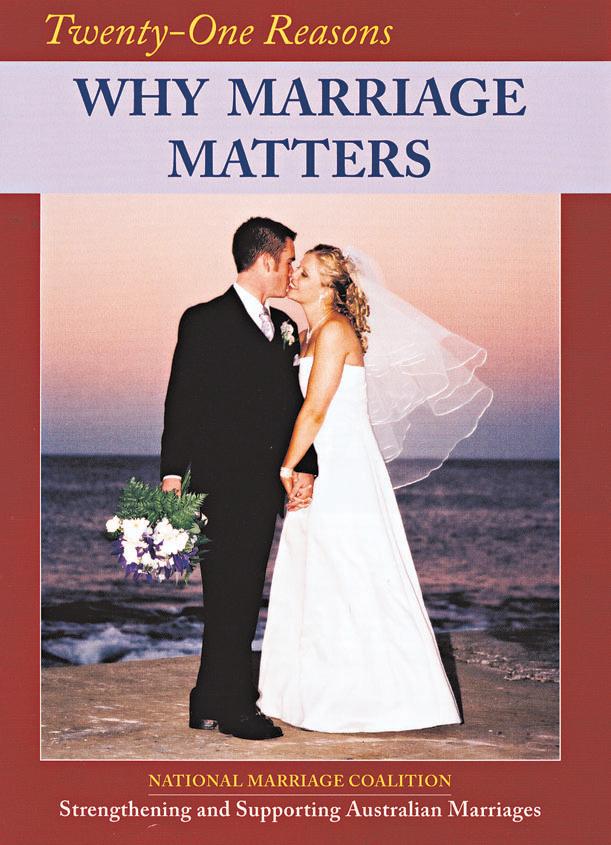
Page 12 August 11 2005, The Record
6.
Married couples seem to build more wealth on average than single or cohabiting couples. The Record is publishing all 21 reasons. However, if you can’t wait Twenty-One Reasons Why Marriage Matters by the National Marriage Coalition is available from us for just $5 plus postage and handling. Contact Eugene on (08) 9227 7080 or e-mail administration@therecord.com.au
Why Marriage Matters...
Available now from the Record! Contact Eugene on (08) 9227 7080 or e-mail administration@therecord.com.au
























 Lydia Fernandez
Lydia Fernandez















 ■ By Fr Joseph Parkinson
■ By Fr Joseph Parkinson


































